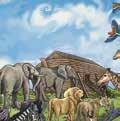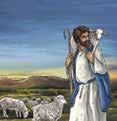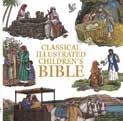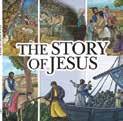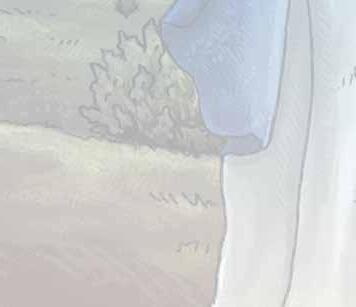


















































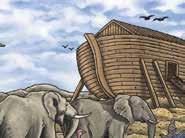
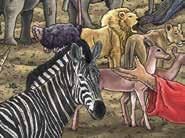







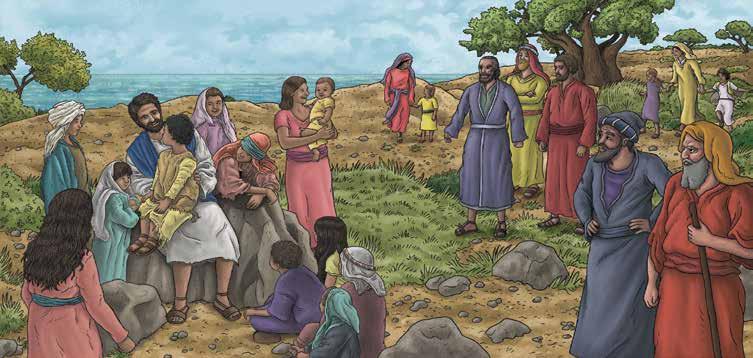

Copyright © 2025 Christian Media Publishing
Christian Media Publishing P.O. Box 3228, Matieland Post Office, Stellenbosch, 7602, South Africa www.christianmediapublishing.com
All rights reserved. No part of this publication may be reproduced by any means – electronically or otherwise –without the prior written permission of the publisher. Reg no 2010/008573/07
Author: Christian Media Publishing
Illustrations: Chris Venter
Layout: Christian Media Publishing
First edition 2025
1 3 5 7 9 10 8 6 4 2
ISBN:[REVIEW COPY]
Welcome to this resource of Children’s Ministry Notes, created to accompany the best-selling Classical Series of children’s Bibles. These notes are designed with you—the Children’s Ministry Practitioner—in mind. They will guide you in helping children encounter God’s Word in ways that are engaging, practical, and life-giving.
At the heart of these notes lies Thomas Groome’s Faith Education Model, a method that encourages a dynamic interaction between the Christian Story and Vision and the lived experience of children today.
• The Christian Story includes the Scriptures and the traditions of our faith.
• The Christian Vision invites a response—how we live out the story in our daily lives.
This back-and-forth between “our story now” and “God’s Story then” encourages children to make meaningful connections, so that the Bible is not just a book of ancient stories but a living Word that speaks into their lives today.
The notes are structured around the 57 stories presented in the full editions of the children’s Bibles. Each lesson provides a simple yet thoughtful framework to help you lead children in their faith journey. Importantly, these notes are resource-friendly: they are practical for contexts where there may be little access to materials or equipment.
Every session follows a similar flow, making it easy for you to prepare and teach:
Aim and Outcome
Each lesson begins with a clear purpose—what the children should understand, experience, or be able to do by the end.
Our Story (Our Now)
This section helps children reflect on their own experiences. You are given engaging, age-appropriate questions that allow children to share their thoughts before hearing the Bible story. This step invites them to bring their lives into conversation with God’s Word.
Our New Story (God’s Story)
Here the children encounter the biblical passage. The story is read directly from the children’s Bible, with guidance to draw out what God is teaching us through it.
Another Story
A related illustration or real-life example helps children see how the biblical message applies to everyday life. This makes the lesson concrete and relatable.
Activity
A simple activity is suggested to reinforce the lesson. Activities may be placed either before or after the Bible story, depending on what works best for your group. These activities are designed to be practical and adaptable, requiring few materials.
Children learn best when they are able to connect what they know and feel now with the bigger story of God’s love and purpose. By weaving together their own experiences (“Our Story”) with Scripture (“God’s Story”), and then inviting them to live out the vision of faith, these notes help children take steps toward authentic discipleship.
As a practitioner, your role is not only to tell Bible stories but also to create space where children can:
• Wonder and ask questions
• See themselves in God’s story
• Discover that faith shapes daily living
• Respond with simple but meaningful action
You may not have access to many resources, but the most important resource you bring is yourself— your faith, your care for children, and your willingness to lead them into God’s story. These notes are designed to support you, whether you are experienced in ministry or just starting out.
By following this simple structure, you can be confident that each lesson is grounded in Scripture, connected to life, and oriented toward growing disciples of Jesus Christ.

To understand that everything in nature we can see is God’s, made by God and loved by God. It is for us to appreciate and enjoy God’s creation, and to take care of it.

Ask the children the following questions:
• What is the most beautiful thing you’ve ever seen in nature?
• If you could make your own animal, what would it look like and what would it do?

• What’s something in creation that reminds you that God is good?
• What is one thing you love about the way God made you?

Show the picture in the Children’s Bible while you read the story The beginning.
• What surprised you about the story of creation?
• Why do you think God was happy with the light that God created?
• What does it say about you that God made people in the image of God?

• What did you learn about God today?
• What does this story tell you about how God sees the world?
• If God made everything good, how should we treat the world and other people?
What is the most amazing animal that God created? I am sure everyone will have a different answer. Here are a few that I love:
A peacock can push its feathers out, and make a most beautiful and impressive display with his tail.
Think about an ant. An ant is a tiny creature, so small you can hardly see it. But an ant can see and walk and smell. It can find out where sugar is, and call its friends! It can eat and digest and sleep, all with that tiny body.
There are octopuses that look like jelly balls with eight legs. Have you ever wondered how you would manage with eight legs? They are very intelligent creatures, even though they look like jelly! Cockroaches are more interesting than many other animals! Researchers have found out that they can survive for weeks without their heads. How can that be? Rather than breathing through a mouth, they breathe through holes in their bodies.
Think about giraffes and their necks, zebras and their stripes, kudus and their horns, lions and their roar, bees and their honey.
There is an old song that I love that says:
Yes, God is good: in earth and sky, From ocean’s depths and spreading wood, Ten thousand voices seem to cry, God made us all, and God is good.
Written by J.H. Gurney more than 100 years ago.
Maybe you can say the words of the song after teacher, and even learn them.

See which of the following three activities will be best for you:
Go for a walk as a class, and have everyone pick up something from the natural world to take back to the class. Back in class, have each child show what they found, and say why they like it. or
Depending on where you are, and what your surroundings are like, you could take older children on a walk outside to pick up rubbish, as an act of taking care of creation. If so, you will need one or two rubbish bags, and preferably a glove for each child to wear. or
Have the children pick leaves and maybe a few flowers. Then, give them a page and glue to make a nature picture by drawing and pasting leaves and flowers on the picture.
Genesis 2 and 3

To understand that sin drags us down –but God picks us up!

Ask the children the following questions:
• If you lived in the Garden of Eden, how do you think you would have acted differently than Adam and Eve?
• Why do you think we fall so easily for sin and temptation (temptation is a feeling to want to do something that can be harmful, wrong, or against the rules)?

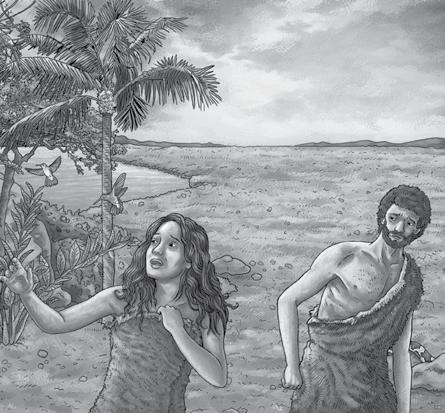
Show the picture in the Children’s Bible while you read the story Adam and Eve leave the garden.
• Are we strong enough to overcome sin and temptation by ourselves?
• How does sin change your relationship with God?
• How did Adam and Eve feel at the end of this story?
• To sin, one can say, is to miss the point. God says, life is about loving others, but we act selfishly. God says, “my way is about being kind and honest and caring”. But we sometimes choose to be rude and dishonest or hurtful. We miss what God, who made us, and loves us, wants for us. That is sin.
• What makes sin so dangerous? What are the consequences of sin?

• Can you think of anyone that you have hurt by doing sin? Maybe you can go to them and ask for forgiveness.
• All of us have sinned, sometimes on purpose, sometimes because a friend tempts you to do something, sometimes because we don’t know what we’re doing is wrong. But, like always, God is
ready to forgive you, and teach you to follow God’s ways. If you know that you sometimes sin, how do you treat other people who are also struggling with sin?
• If Jesus died on the cross for all our sins, and if God forgave us all our sins, why do you think we should still say sorry and turn away from the wrong things we’ve done (repent) daily?
When you read the story about Adam and Eve and how they had to leave the garden, it might remind you about the saying “there for the grace of God, go I.” This saying belongs to the preacher, John Bradford, many years ago who said this while watching people who were caught for doing bad things, being led away to prison. He was saying that if it were not for the goodness of God showing him the right way, he too, would have been doing such bad things!
Without God’s grace, we can be very cruel and nasty. Followers of Jesus are taught to live like Jesus; therefore, we should always show kindness. Without God’s grace (grace is God’s unlimited love and kind-heartedness, especially when we don’t deserve it or even ask for it), we are trapped in sin and make bad choices – daily.
A TV programme presenter made a film about a very bad man. He asked this important question at the beginning of the programme: “How is it possible for a man to act as this man acted? Was he a monster? A madman? Or was he perhaps something even more terrifying: was he normal?” Was he just an ordinary man who was in a bad place, and made some very bad mistakes?”
One person who suffered a lot because of this man, years later said something like:
“All at once I realised, he was not the powerful army officer who had sent so many to their deaths. This man was an ordinary man. I became afraid about myself. I saw that I am capable of doing this. I am... exactly like him. This person who got hurt said he understood now that all of us can be very, very bad. It is God’s grace – God’s unlimited love and kind-heartedness, especially when we don’t deserve it, or even ask for it – that helps us not to become the worst person you can imagine. That can happen when we turn our backs on God’s grace, and we choose another way, that is not God’s way.
Is there hope for us then, who can all also make bad mistakes, whose story is almost the same as Adam and Eve in the Garden of Eden? Yes, hope is the grace of Jesus who holds us close to God’s heart, if we let him!

Prepare for the activity by putting a home-made target on a wall, about 20 cm in diameter.
Let the children take time to throw something at it – a small ball or a bean bag, for example, from a distance (so that they are likely to miss the target).
After everyone has had a turn, talk about:
Did anybody throw the ball perfectly in the middle of the target every time? (hopefully, the answer is no, they would have stood too far from the target, to begin with!)
However hard we try, we sometimes get it very wrong… and sometimes we don’t even try! Did you get tempted to throw the ball at a friend, instead of at the target?! … and by doing that, miss the target, and hurt your friend at the same time? That’s a bit what sin is like.
Genesis 6 and 7

Noah teaches us to keep on doing the right thing and God will act in God’s time.

Ask the children the following questions:
• Can you think of a time when everything felt like it was going wrong?
• What do people around you do when they feel hopeless?
• When you’re scared or sad, who or what helps you feel safe?
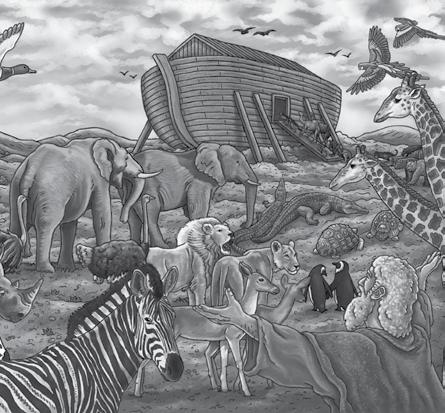
• Have you ever seen someone continue to do the right thing, even when others made fun of them?
• How do you think people feel when they believe no one sees them or understands what they’re going through?
• Do you think it’s easy or hard to trust God when life is full of problems? Why?

Show the picture in the Children’s Bible while you read the story Noah and the flood.
• What do you think Noah felt when God told him to build a boat, even though there were no clouds in the sky?
• Why do you think Noah listened to God when others did not?
• What do you notice about God in this story?
• Where in the story do you see trust, fear, hope, or rescue?

• When things go wrong in your life, how might Noah’s story help you think or act differently?
• Can you think of a small way you could trust God this week, even if things don’t make sense?
• If God is like the way we see Him in Noah’s story, how could it change you if you trusted Him more?
Yacouba Sawadogo was a farmer in Burkina Faso in West Africa. Fifty years ago, he started seeing the land of his farm slowly turn into desert. It was dry, the soil was no longer producing beautiful grains and vegetables. He thought: “What now? How will I be able to feed my family and the community if my farm is becoming useless?”
Instead of giving up, God gave him a very good idea. He revived an old farming technique called zaï: digging small pits in dry soil, adding compost, and planting seeds there.
It took a long time, like Noah had to stay in the ark for a long time before he and his family and the animals could leave, and then wait for the water to subside (sink into the ground).
Over many years Yacouba’s patience paid off. His small fields turned green again. Eventually other people, and then entire communities began using his method, of zaï, restoring thousands of acres of dead land. Life in the whole are changed, and people had enough food to eat again!
Yacouba did not give up. He kept on doing this work for a long time before he could see results.

Gather 10 stones (not bricks, because they will stack too easily), about the size of your fist.
In class after the lesson, give each child a chance to build a tower with the stones. If you have more stones, a few children can build at the same time.
The aim is to see who can build the highest tower in the shortest time. Let the child try and try again when the tower tumbles down, as many times as they can, before they give up.
Talk about the value of persevering and not giving up, even when the task is hard.
Genesis 8 and 9

God cares about the earth with its animals, plants and humans. Rainbows remind us of that. Children need to know that a promise God makes is a promise God keeps.

Ask the children the following questions:
• Have you ever seen a rainbow? When do you see rainbows?
• What do you feel or think about when you see it?
• What is your favourite colour in the rainbow?
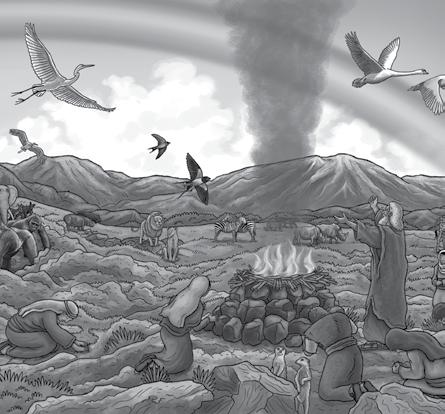
• Have you ever made a promise to a friend? What happened?
• Have you ever had to wait for something for a long time? What was it like?

Show the picture in the Children’s Bible while you read the story Noah and the rainbow.
• How did Noah show his trust in God?
• What did God promise to Noah?
• How can we take care of the earth like God wants us to?
• What does this story teach us about God?

• What will you think of the next time you see a rainbow?
• How has God been faithful to you?
• How can you remember God’s promises?
• The rainbow symbolises hope and trust in God. What can you do to give people hope or remind them that we can trust God?
There was once a man and a woman who survived a massive earthquake in Armenia, a country in Europe. They weren’t alone—they had a son, and he had been at school when the earthquake hit. When the shaking stopped, the father turned to his wife and said, “I have to go check on our son!” He ran straight to the school, but when he got there, he was shocked. The school building had collapsed. It was as flat as a pancake.
At first, the father started crying. But then he remembered something he had always told his son: “No matter what, I’ll always be there for you.”
It looked hopeless, but that promise kept him going. He remembered where his son’s classroom had been and headed that way. He started digging through the rubble.
People around him tried to stop him. “Your son is gone,” they said. “It’s too late.”
But the father didn’t listen. He just kept digging — 8 hours, 12 hours, 24 hours, 36 hours. He was so tired he could barely stand. But he didn’t stop.
Then, in the 38th hour, he heard a voice.
“It’s my son!” he shouted. He called out, “ARMAND!”
From under the rubble, he heard the voice he had been praying for: “Dad? It’s me! I told the other kids that if you were alive, you would come. You promised, ‘No matter what, I’ll always be there for you.’ And you kept your promise!’
The overjoyed father asked, “How many of you are there?”
Armand answered, “There are fourteen of us. We’re scared, hungry and thirsty, Dad.” The father reached out and said, “Come on, son.” But Armand said something amazing: “No, Dad – let the others go first. I know you’ll come back for me. No matter what.”
That is a promise, that is love, that is courage. The father was brave, and so was his son.

The children draw rainbows on cards or paper.
Then let them write Genesis 9:16 on it or help them to write the text if they are too young to write this themselves:
“When the rainbow appears in the clouds, I will see it and remember the everlasting covenant between me and all living beings on earth.” (A covenant is a forever-promise that cannot be broken.)
Let the children give their cards to someone as a reminder of how wonderful God is.

To understand that God has a plan to bless the world –and you are invited to participate!

• Play a game of “cold or warm”. Let someone hide a “treasure”. Everybody looks for the treasure and the person who knows where it is hidden, gives clues, i.e. “cold” when you are looking in the wrong direction and “warm” when you get near to it. How did it feel when you found it?
• When did God last bless you with something? Can you make a list of God’s blessings?
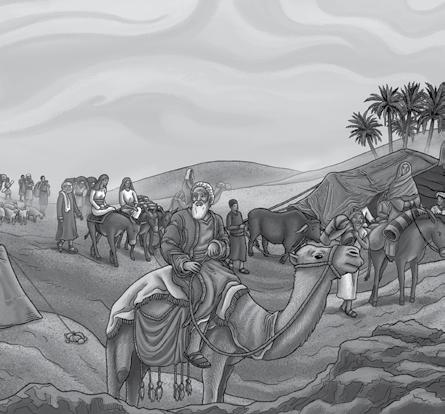
• Do you think God has a plan for your life? Is God calling you to serve Him? How can you be sure?
• Do you think all is well on earth? Is there peace on earth?
• Do you think followers of Jesus must take better care of earth and the ecology?

Show the picture in the Children’s Bible while you read the story God calls Abram.
• How do you think Abram felt when God asked him to move? Do you think he was excited, or scared?
• Why did God ask Abram to move?
• What does it mean when God calls someone? What did God want Abram to do?
• How did God bless Abram?

• God is calling all followers of Jesus to be a part of God’s plan to bless the world. How can God use you to bless others?
• Invite children to bring an empty box – any size – to class today. Or tell them about this today, and get them to do the project at home in the week and report on it next week:
• Take a box – it is now a Box of Blessings. Every time God blesses you, you write it down on a piece of paper and throw it into the box. Every now and then, read all the blessings to remind yourself that God has a plan for you.
• God wants to bless you, so that you can bless others. How can you bless others today? How can you be a blessing to the whole earth?
Mr Nelson Mandela, who was the President of South Africa one time, quoted the writer Marianne Williamson in his first speech as President in 1994. She wrote in her book, A Return to Love: “Our deepest fear is not that we are inadequate, our deepest fear is that we are powerful beyond measure. It is our light, not our darkness, that most frightens us. We ask ourselves, Who am I to be brilliant, gorgeous, talented, fabulous? Actually: who are you not to be? You are a child of God. You playing small doesn’t serve the world.”
Let me say it in other words: it is scary to think we are not good enough, but even more scary is to realise we are actually very powerful. We can do things and say things that can make a wonderful difference and change our school or out town, but we also have the power that can hurt people terribly.
So, use your power well. Let your light shine in your world, and don’t be scared of that! Ask: “Who am I to be smart, beautiful/handsome, talented, wonderful?” And answer yourself: “Well, why not me? I am a child of God. Pretending I’m a nobody is useless. I am Somebody, and somebody special.” Believe it, and be a blessing to the world.
Say it. Believe it. You are meant to be a light, bringing joy to the world, and kindness to the people you meet!
Be the person God wants you to be!

You will need paper and pencils of crayons.
Have each child take time to draw a picture of themselves—full body or portrait. Ask them to draw the best picture they can.
Let them write below,
I am smart, beautiful (or handsome), talented, wonderful. I am a child of God.
Then let the children sit looking at the picture, and take turns to say how each of them would like to do something good in the world and bless other people.
Genesis 17 and 18

Persevering in prayer, faith and work has great value.

Ask the children the following questions:
• Have you ever had to wait a very long time for something you really wanted?
• What did it feel like while you were waiting? And when you received the thing you were waiting for?
• Has someone ever made a promise to you? What was it? Did they keep it?

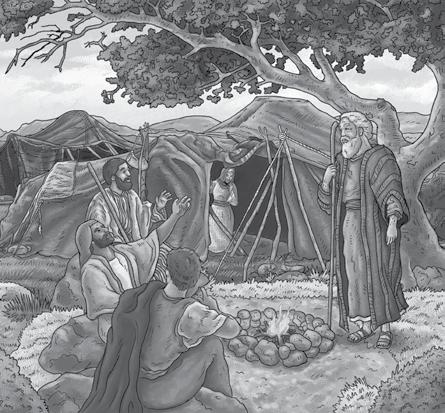
Show the picture in the Children’s Bible while you read the story Abraham gets good news.
• Why do you think people sometimes stop believing in promises?
• What do you think happens in our hearts when we wait a long time for something good?
• Can you think of someone you know who keeps their promises? What makes them trustworthy (in other words, worth trusting)?
• In this story, what did God promise Abram and Sarai?
• How old were Abram and Sarai when God gave them this good news? What do you think they felt when they heard it?
• Why do you think she laughed when she heard the promise?
• What does this story show us about the kind of promises God makes?

• What promises from God can we hold onto today, even if we don’t see them yet?
• How can we learn to wait like Abram — trusting even when it’s hard?
• When you feel like giving up, how can this story help you?
William Kamkwamba grew up in Malawi, a beautiful country with a very big lake.
When he was fourteen years old, a famine hit his village. There was very little food. The crops kept failing, and the people stopped trying to grow food. They did not have enough money to go to the shops to buy food. There was no money, no food, and no school. You think it is nice to have long holidays and no school? Think again! No school meant no lunch provided by the school, it meant getting bored with no challenges to learn new things, it meant that children might not be able to study further to become something they were dreaming of, like a teacher or a nurse or a scientist …
William believed that something could be done. He found old books and taught himself how to build a windmill from the beginning.
Everyone thought he was dreaming – but he didn’t stop. He worked for many days, went to look for odd pieces of zinc that he could use, and found screws in old pieces of furniture that were not being used. He used tree stumps, broken bicycle parts, and materials collected in a local scrapyard.
William persevered for months until finally the windmill worked. Sarah and Abraham had to wait 9 months for their baby boy. William waited almost that long before his windmill could work. The wind turned the blades of the mill, it created power, pumped water, and made electricity. They could water the plants; they could have lights in the house. Then he built a solar-powered water pump that supplied drinking water in his village and two other wind turbines. Everything was getting better for the community.
His family and village had hope again. Years later, he said: “I believed if I kept trying, God would help me.” This is a true story. Today William is an inventor, a writer, and an engineer. In 2019 they even made a film about his life!
Like Abram and Sarai’s boy would be the grandfather and great grandfather of many people, William helped and blessed very many people as well. All because he would not give up believing that God would help him.

Bring paper cups to Sunday school and tomato or some other vegetable seeds.
After the lesson, let the children go and half fill the cups with soil, plant the seeds, and water them. Let them write on the cup what kind of seed it is.
Prepare the children to take the cups home, telling them if it should be inside or out, in the sun or shade, how often to water it, how soon they may see a little green shoot coming up, when they should transplant it into the garden.
Tell them if they keep taking care of the plant, not give up, in time they may see a tomato appear!
Talk about how this process is like waiting for things in your life. Prayer is like the water you give to the plant, and the fruit is like an answered prayer.

The story of the birth of a baby to Abraham and Sarah helps us to trust that God always keeps God’s promises, even when it seems that we wait a long time.

Ask th children the following questions:
• Do you like to wait? What do you do while you have to wait?
• How do you know if you can trust someone?
• If you made plans and they don’t work out, how do you handle it?
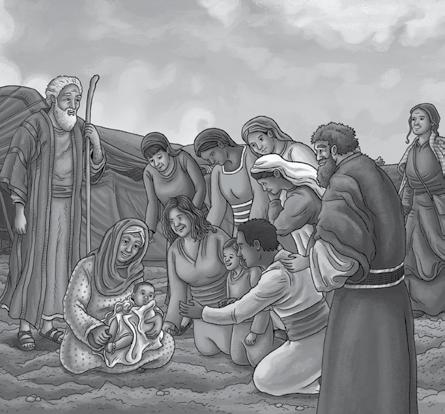
• What’s something that made you really happy or laugh out loud?

Show the picture in the Children’s Bible while you read the story A little boy is born.
• Why do you think it was hard for Abraham and Sarah to trust God’s promise?
• What does the name “Isaac” (laughter) tell us about how Sarah felt?
• Have you ever felt like giving up while waiting for something?
• What does this story teach us about God?

• Someone said: It can be easy to trust God when you have everything you need. It is more difficult to trust God when you do not get what you want. Do you think that is true?
• How does this story help you trust God more?
• What promise from God do you want to remember this week?
There is a story about a family who got stuck in their house because it rained very hard, and it started flooding. They were all scared, and climbed on the table. The father said, let us pray for God to send us help. And they all prayed together. They waited an hour, and the water was higher. Someone came past in a boat, and said: “Climb in, I can take you to safety.”
“No thank you”, they said, and kept waiting.
The water kept rising and they climbed onto the roof, waiting for God to answer their prayer. Somone came over the house in a helicopter. They shouted to the family: “We’ll let down a rope and pull you up. We’ll take you to safety.”
“No, thank you”, they said.
The rescue team in the helicopter shouted back: “Why won’t you come? You are getting wet and tired!” The family replied: “We prayed for God to rescue us. Surely, he will come soon!”
And the rescue team said:” Dear friends, God has already sent a boat and a helicopter! What else do you want? Come now, we will take you to safety.”
Sometimes we have to wait a while for God’s time to answer our prayer. And sometimes he answers quicker than we can imagine.
In our Bible story, Abraham and Sarah couldn’t imagine how God could keep His promise about a baby. They couldn’t think that it would be Sarah herself, as old as a granny who would have a baby through God’s miracle. But God kept God’s promise. They just had to trust and wait. We also need to trust and wait for God. Sometimes we will be surprised like Sarah and Abraham, and like the family on the roof, that there are people right there who become the answer to our prayers. Trust and wait. God will supply your need.

Write the following on a big piece of paper or on a board for the class. Or if you can, make one for each child to fill in: Let us together figure out what the Bible says in Philippians:
Find the following words in the word search grid above. They can be written straight or diagonally.
supply all abundant needs Jesus his through Christ will wealth with God my your and
Once you have found all the words, work together to make a sentence. Then check in Philippians 4:19, how close you are.

To learn about relationships like marriage and the importance of trusting God, and loving and respecting your partner always.

Ask the children the following questions:
• Have you ever been to a wedding?
• When you are young, your own marriage can feel very far away. Do you dream about getting married? What do you dream about?
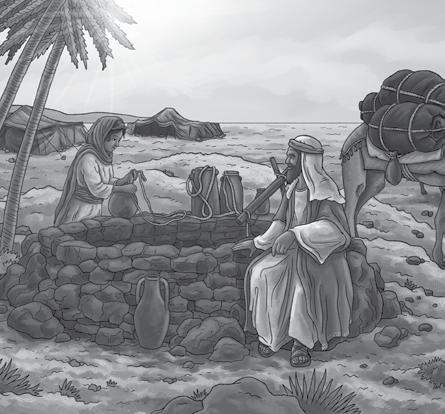
• God always answers our prayers. Sometimes God says “yes”, sometimes He says “that’s not a good idea” and sometimes God says you must wait. How do you know when God answers your prayers?

Show the picture in the Children’s Bible while you read the story Isaac and Rebekah.
• God answers a few prayers in this story. See if you can find at least three answered prayers.
• How do we hear God’s voice? How can we make sure that we are following His plan and not our own?
• Abraham’s servant needed faith that God would show him the right person to marry Isaac. Is that something we can ask God to show us, even today?

• “You can ask God for guidance for anything in your daily life.” Do you agree?
• Do you know a married couple that has been happily married for many years? Ask them why they enjoy being married.
The son of a very rich man was sent to another country to find himself a wife. He was ready to marry a girl in return for a dowry (a price you had to pay the father of the bride) paid in horses. The more beautiful the girl was, the more horses you had to pay. The most beautiful and clever daughters were worth 10 horses but the average daughter was only worth 5 horses. The son stayed in the village for a time, looking for his wife. One day he met a girl. She was shy and didn’t have any nice clothes. No one would call her beautiful, and she was teased by all the other girls in her village.
He thought: there is something about this girl that other people are not noticing. My heart feels for her. I am sure she is the one I should choose, if she will have me. He went to her family, heart beating fast, to see what would happen if he asked her family if he might marry her.
The girl’s father only asked for one horse, because he thought no one would be interested in his girl. But the young man refused! He paid the father 20 horses, more than anyone in the village ever got at the wedding of their daughter, because, he said, that is what he thinks this girl is worth.
For five years nobody heard anything from them, until one day, the young man came to the village again. This time, he wasn’t alone. With him was the most beautiful woman they have ever seen… until someone said: “Look, I think it’s ugly Lizzie that he paid 20 horses for! What happened?” They realised she wasn’t ugly anymore. So, they asked her: “How did this happen?” and the girl, now a woman, answered: “I thought I was only worth one horse, but my husband loved me and thought I was worth twenty horses… so I started treating myself and acting like someone worthy of twenty horses.”

Play-act a wedding. Have a bride and groom, a minister/pastor, bridesmaids, guests. Have the children share “how I will try to be a good husband/wife if I get married one day.”
Genesis 25

To learn that we should love one another, even when we are different.

Ask the children the following questions:
• Do you know someone who is very different from you? Maybe there is someone in your family, your class, or your village or town?
• What do you like about them? What is difficult to like?
• Have you ever had a fight with someone close to you, like a brother, sister, or friend?

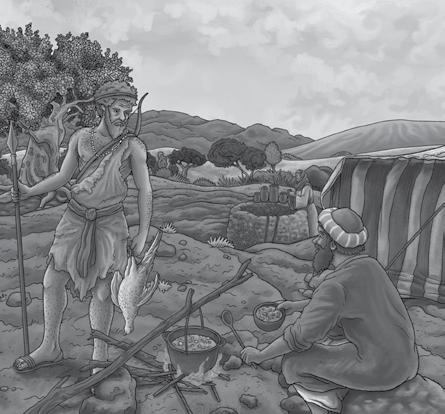
Show the picture in the Children’s Bible while you read the story A pot of lentil stew.
• Why is it sometimes hard to get along with people who are different from us?
• What happens in a family or a group when people stop caring about each other?
• What do you think makes love stronger than anger or jealousy?
• What do you notice about Esau and Jacob in this story? How are they different?
• Why do you think Jacob asked for something so big in return for a simple bowl of food?
• How do you think Esau felt afterward?
• What does this story show us about how easy it is to hurt each other — even in a family?

• What can we do when we feel jealous, angry or proud — like Jacob and Esau?
• How can we show love, even when someone is different or difficult to be around?
• What kind of family or community could we build if we choose love instead of trying to win?
Wangari Maathai grew up in Kenya. She noticed that land was being destroyed, and people were fighting over water and firewood. She started planting trees. She planted thousands of them. But even more, she brought people from different tribes and sides to work together.
Many people didn’t agree with her. Some thought she should stop. But she said, “We are one people. We must care for the land and for each other.” Her tree planting helped women, families, and even enemies learn to work together.
Wangari received the Nobel Peace prize for her work, a prize that the whole world celebrates, and many famous people would love to have. This ordinary woman from Kenya received the prize in 2004, the first African woman to win the prize! She was also the first female professor in her country. All girls should read Wangari’s story, and know anything a boy can do, a girl can do, too.

In a land made of shapes, there lived a circle, a square, and a triangle. The circle was round and smooth, always rolling and bouncing. The square was strong and had four corners, always standing tall and firm. The triangle was sharp and pointy, reaching to the sky.
One day square and triangle started arguing. “I’m so strong,” said the square, “I can hold anything up!” “But I can point to the sky and be sharp and pointy,” said the triangle. The circle just rolled around, watching them. The square laughed, “What can you do, just roll around?” The triangle agreed, “Yes, you’re just a blob!”
The circle sighed, “But I can be a ball, a wheel, and so much more!”
After arguing a lot, falling, rolling, and getting confused, they all decided to work together.
• Draw a picture of how you think a circle, a square, and a triangle can together make something good or beautiful. (You can put faces on your shapes!) Then go round, and look at one another’s pictures.
• While you do that, remember that every shape is unique and important, just like every person is. When we appreciate each other’s differences and work together, we can create amazing things.
Genesis 25; 27 and 28

To understand that we do make wrong decisions sometimes but God is always ready to help us turn back from a bad decision. We learn about redemption, which is a second chance, or a way to make amends for mistakes or overcome difficult situations.

Ask the children the following questions:
• How do you feel when someone lies to you?
• Have you ever done something bad and had to say sorry to someone?
• How do we know when it’s time to say sorry?
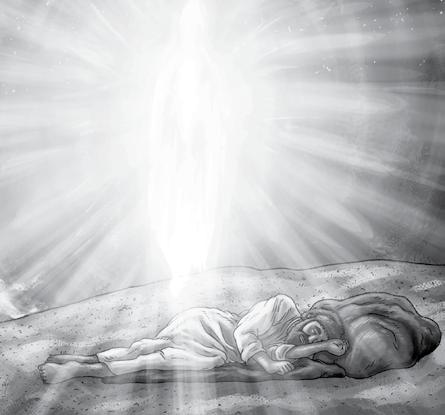
• Have you ever felt far from home or far from people you love?
• Do you believe God is with you even when no one else is around?

Show the picture in the Children’s Bible while you read the story Jacob and the stairway to heaven.
• Why do you think Jacob and Rebekah tricked Isaac?
• How do you think his brother Esau felt when he found out what happened?
• Even though Jacob lied, what did God still do for him?
• What does this story show us about God’s love and forgiveness? (God’s forgiveness is when you have done something hurtful to God, others, yourself or God’s creation, but you realise you have done wrong. God will not stay upset with you, but will let go of that thing, wiping it out of God’s mind, and helping you to know that you can start on a clean page with God again)

• When is it hardest to believe that God is still with us?
• What does it mean that “God is in this place” like Jacob said at Bethel? How can we remember that in our own lives?
Here is a story form Italy that talks about something that fell to pieces, but got restored again, like us when God forgives us.
in 1972, something unthinkable happened at a famous church, the St. Peter’s Cathedral. A man attacked one of the world’s most famous sculptures with a hammer. The statue is called Pieta (it is a statue of Jesus when he died, with his mother, Mary), created by the famous artist from long ago, called Michelangelo. What a pity! It had been beautiful, and now it was badly damaged.
This masterpiece, sculpted with such care and beauty, was ruined. It could’ve been deemed broken and thrown away, or left in its smashed state. But instead, the officials didn’t give up on it.
They called in the best art restorers, the most brilliant people, and provided every resource they could to bring the Pieta back to the way it should be. The restorers did a great job. It took a lot of time and effort and money, but they could bring it back to being a beautiful statue.
Today that sculpture, once damaged and broken, still stands in its place of honour, admired by millions of people.
It was restored—not just to what it once was, but with a new beauty. This is a story of redemption written into its marble. (Redemption is to restore something—or someone— that was lost, broken, or worthless).
If humans treasure their creations or possessions so deeply that they go to such trouble to restore them, how much more does God, the One who created us in to be in God’s image, value you? How much more will God spare no expense to restore God’s children, no matter how broken, no matter how far we’ve fallen?

Jacob found a stone to remind him that he belonged to God always, even if he made mistakes. People in the Bible often used stones to put somewhere special to help them remember something important about God.
Let the children go outside, and have each one pick up a stone. Let them come back into the class, have a bowl of water ready so they can wash their stones, then hold the stones in their hands.
Let each one in turn, holding the stones, say to the class what they hope to always remember about God, for the rest of their lives. If they can, let them write that memory down, so they can take the paper and the stone home to keep.
Genesis 37:1-11

To understand that all families are imperfect, but God’s grace is for everyone.

Ask the children the following questions:
• Have you ever been the “teacher’s pet” or the “special child”? Do people like it, or does it make one feel uncomfortable to be the favourite?
• What is the strangest dream you’ve ever had?
• Families often get hurt – and then they pass the hurt on to the next generation. Can you think of hurts that families have passed on?

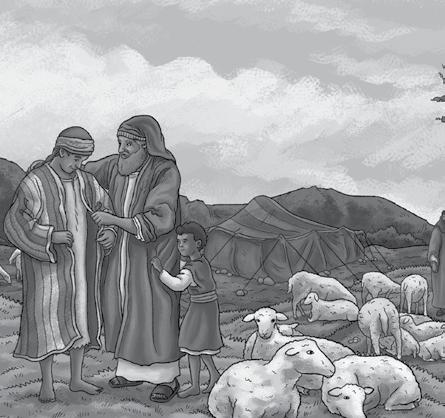
Show the picture in the Children’s Bible while you read the story Joseph, the dreamer.
• God was calling Joseph, speaking to him through his dreams. Do you think Joseph realised it at this stage?
• How do you think Joseph handled the situation—poorly or well? Was he just a spoiled boy?
• Do you think Joseph would have acted differently if he knew that God would be with him all the way, and have a plan for his life?
• Why does God use people with weaknesses?
• What lessons – good or bad – can we learn from Joseph’s story about our own family life?

• How can you make yourself available to God so that He can use you?
• How does God speak to us today?
• We learn a lot about God’s providence (God’s plan and providing for us) in this story. How does God provide, even today?
• God has a plan for your life; He created you with a purpose in mind. How does that make you feel?
• What dreams do you have for your own family?
One day there was a family who lived in a small village far away from the city. There was a mother who worked hard as a nurse, to manage to send their daughter, Ayanda, to school and buy her the things she needed. She worked extra-long hours to manage to buy what Ayanda needed. Her father died when Ayanda was just five years old.
But grandmother and grandfather helped to look after her, even though they didn’t have money to give their daughter. But every summer Ayanda could go and visit Aunty who lived by the sea, and took her for swims and for ice cream. Ayanda loved those holidays.
The family saved all they can, and even friends did, also. And so, when Ayanda finished school she went to university, where she learnt to become a doctor.
She finished studying and got a bursary to go to Nairobi in Kenia to study further! What a wonderful thing to happen to her. When she finished, she could choose to go anywhere in the world to be a doctor and earn a lot of money.
But Ayanda came home, to her little village. She said: “My family and my neighbours taught me the best things in life. Even better than school or university or Nairobi. They taught me to work hard like my mother, to be kind like my aunty, and to share the little you have, with the neighbours. And that is what I will do in my village, to help my family and all our friends. That is what is important to me.”
Do you see how important families can be? We must appreciate them, and learn from them, and help them even when they make mistakes.

Draw your family tree. Include everyone you know about, from your grandparents to you, that are important in your life. Here is an example:
Aunty lives with us
Sister left home brother (16) brother (14) me (9)
Then talk about: Who are you closest with in your family? What is your prayer for your family?
You can talk to teacher after class if you worry about your family, so teacher can pray with you.
Genesis 37:12-36

To learn that even if people abandon us, God will not abandon us.

Ask the children the following questions:
• Have you ever felt left out, forgotten, or treated unfairly?
• What does it feel like when someone close to you turns their back on you?
• Who do you talk to when you feel like no one is on your side?
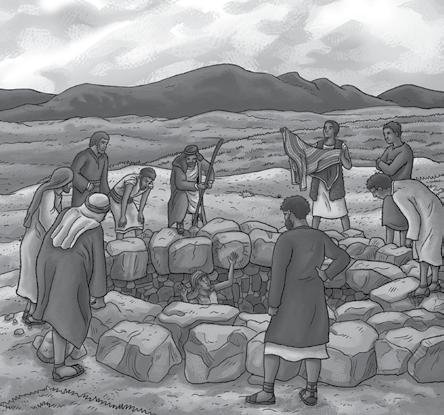
• Why do people sometimes hurt others, even in the same family?
• What do we do when we feel like nobody sees us or cares?
• Can someone feel abandoned, even when they’re surrounded by people?

Show the picture in the Children’s Bible while you read the story Joseph’s brothers try to kill him.
• What do you notice about how Joseph’s brothers treated him?
• What do you think Joseph felt when he was thrown into the empty well? Or when he was taken far away?
• Was God still with Joseph, even when it looked like everyone else had left him?
• How do we know that Joseph’s story wasn’t over yet?

• When you feel alone or forgotten, what can Joseph’s story remind you of?
• What would it look like to trust that God is still with you, even when others are not?
• Who in your life needs to know that they are not alone?
In 1994, when there was a very bad situation in Rwanda, many people were attackedor killed for no other reason than belonging to a tribe, nation, or language group. There lived a girl, Immaculée Ilibagiza.
Immaculée was just a young woman. Her family was killed, and she had to hide for 91 days in a tiny bathroom with seven other women. The people who were supposed to protect her had turned against her.
She was very afraid, angry and upset with the people who should have protected her and her friends. But she did not let those feelings take over her heart. Rather, she prayed every day with the prayer beads her father had given her. She said, “I am not alone. God is with me.”
Immaculée survived and later, after many tears, was able to forgive those who hurt her family. Immaculée says when she felt fear and hate, she would tell herself that the killers are also God’s children.
Today she travels the world, telling people how it is possible to learn to forgive. She says: “Even in the darkest places, God is still there.”
Left to Tell is a book she wrote, giving details of her journey to forgiving the offenders, including those who killed her family members. Immaculée’s story, has inspired many others who have faced difficulties and loss, demonstrating the power of faith, forgiveness and hope in very dark times.

Read together Joshua 1:9: Do not be afraid or discouraged, for I, the LORD your God, am with you wherever you go.
Let’s work to understand this verse:
• Afraid: In Isaiah 41:4 The LORD says, “Small and weak as you are, Israel, don’t be afraid; I will help you.”
How does it feel to hear that?
• Discouraged: This means to feel you have no more hope, you’ve lost all confidence, or energy, because you are sure you will not manage a certain challenge.
Can you remember a time you felt discouraged? Do you want to talk about it?
• I the Lord your God am with you: What other Bible stories can you remember when God was with someone and helped them and encouraged them?
How does it feel to have your favourite soft toy or blanket with you when you are scared in the night?
How does it feel to know God will always be with you? Wherever you go.
• Draw a picture of yourself walking in a place where you might be scared. Then add a picture to your drawing that shows God is with you.
Then write one of these Bible verses on the same paper, to help you remember God’s promise.
Genesis 39 and 41

To learn that God has a plan, and to trust that God will help us to find a way.

Ask the children the following questions:
• What skill or talent do you have that you want to grow in?
• What job would you love to have when you’re grown up? Why?
• Have you ever helped someone solve a problem? What happened?
• How do you think God talks to people?

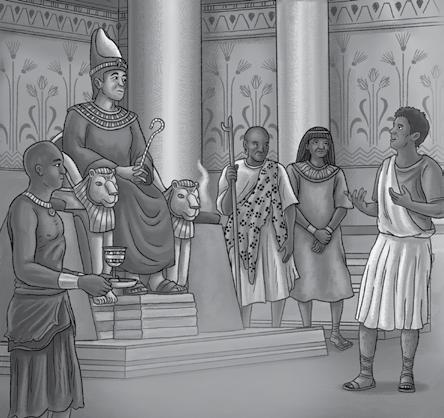
Show the picture in the Children’s Bible while you read the story Joseph in the palace.
• Why did Joseph say, “I can’t do it, but God can”?
• What strange dreams did Pharaoh have?
• What did the fat and thin cows in the dream represent?
• What job did Pharaoh give Joseph after he heard his plan?
• What does this story teach us about God’s timing and plan?

• What part of this story helps you trust God more in your own life?
• What gifts or talents has God given you that you can use to help others?
Once upon a time there was a little boy named Thabo. Thabo’s father was a pastor, which means he taught people about God. Thabo lived in different places as he grew up because his family moved around a lot. Sometimes, they lived in small towns, and other times, they lived in big cities. When Thabo was about eight years old, his dad started to get very sick. Sometimes, Thabo’s father had to go to the hospital because he felt so bad. This made Thabo and his family sad and scared.
Even though things were hard at home, Thabo learned that he could always talk to God. He started praying every day and reading his Bible. Thabo went to church and learned more and more about Jesus.
One day, when Thabo was a teenager, his mother called him and his four brothers and sisters together. She told them that they didn’t have much food left in the house. Thabo’s mother asked them all to pray and trust God to help them.
Thabo said: “Don’t worry, mother. I have learnt how to make beautiful little boats out of the wood from those big trees. With the talent God gave me I will make some more boats to sell, and I am sure we will be able to buy some food. Remember, father taught us to trust God, and to do our best with the talents we have!”
And so, Thabo became quite well known for the beautiful things he made and sold, and he was able to help his family from that time on.

Think about the life of Joseph, that we have read about over the past three lessons: Make a happy face where you think Joseph was happy, and a sad face where you think he was sad.
Joseph is happy in his family
His father gives him a beautiful robe/coat.
His brothers get jealous.
His brothers sell him and he is taken to a far-away land.
He is sent to prison.
He interprets the king’s dream.
The king puts him in charge of the whole land.

Say: Can you see that even the sad things that happened in Joseph’s life helped to make him in charge over the whole land? Can you think of some of the good and the difficult things that have happened in your life?
Some children can share, if they want to.
Pray that God will help you to make a plan, and even to help other people because God helps you grow strong through all the experiences of your life.

To learn about forgiving others.

Ask the children the following questions:
• When do you find it difficult to forgive someone?
• What would make it easier for you to forgive someone?

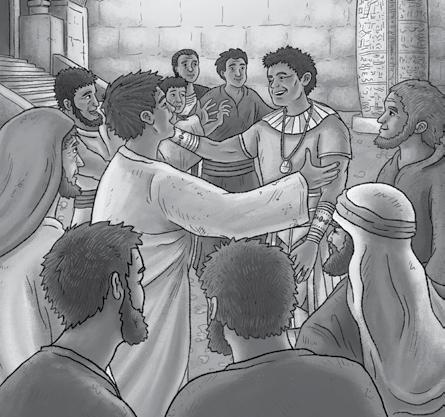
Show the picture in the Children’s Bible while ou read the story Joseph forgives his brothers.
• Did Joseph’s brothers treat him unfairly or did he deserve their anger?
• What does the saying “There is no sight like hindsight!” mean? In Joseph’s case, in hindsight (looking back at things that have already happened), was God present and working for the good in everything that happened?
• How can we know that God was busy with Joseph and his family the whole time?

• How does this story help you to forgive someone that wronged you?
• How is Jesus an even better example than Joseph of how we must forgive people who hurt us?
• God uses Joseph and his family even in their brokenness. How does this make you feel? Do you believe that God has a plan for you and that God calls you?
• We don’t know the future. We can know though, that God is already there in the future – how does that help you to live as a follower of Jesus?
There is a story, not a true story, but a story that teaches the truth. One day a girl did something that was very bad. Her brother discovered the sin. He was very angry, because he always wanted to do everything right. But he said that he forgave his sister, as the Bible said he should. In his heart of hearts, however, he could not forgive her. Whenever he thought about her, his feelings were angry and hard.
God sees our hearts! Each time he felt the secret hate, an angel would come and drop a small stone in his heart. Each time a stone dropped into his heart, he felt a stab of pain, like the pain he felt the moment he discovered his sister’s sin. His heart grew heavy with the stones. Eventually his chest was so heavy that he was all bent-over. He began to wish he was dead.
The angel came to him one night, and told him how he could be released of his hurt: The boy needed to remember his sister like she had once been, the lovely girl she could become again. “No”, said the boy. “Nothing can change the past. She is guilty, and that’s a fact that not even an angel can change.”
“Yes,” said the angel. “You are right, You cannot change the past. You can only heal the hurt that comes to you from the past. And you can only do that with the vision of new eyes.“
“And how do I do that?” asked the brother. “Only ask God to help you.” said the angel.” And each time you see your sister with new eyes, one stone will lift from your aching heart.” The boy could not do it at once, because he had grown to love his hatred. But with God’s help he tried.
Soon the girl began to change in his mind. He could see her again as the sister he loved. She had made mistakes like we all make mistakes, but no one should be trapped in their sin forever.
The angel kept the promise and lifted the stones from the brother’s heart one by one, and he felt his load grow lighter, until they could start to be kind to each other again.

Have half the class take a piece of paper and write the word ‘grudge’ (a grudge is when you stay upset and even angry at somebody for doing something to you a long time ago). Put this paper on someone else’s back – keep it there with your one hand. Do not use glue or a pin to keep it there. Now let the other child move around – but do not let the piece of paper get away from the person’s back. Follow them round, and don’t let go!
That’s what a grudge feels like – you are stuck and it’s not good for either one of you. Talk about this exercise:
• Are you deciding where to go? Or do you have to follow the person with the piece of paper on their back?
• Why are you “stuck” to the other child?
• What happens when you let go?
• How is forgiveness like letting go?
• If you can’t forgive someone, if you are holding a grudge against someone, who is the “prisoner”?
Say the Lord’s Prayer together, then talk about the line that says “forgive us our sin as we forgive those who sin against us.”

To remember that your life is important to God and to others, even as a child.

Ask the children the following questions:
• Who are the people in your life who make you feel seen and loved?
• Have you ever wondered why you were born or what your life is for?
• What makes someone important? Not just to God, but to their family, their village, their friends?
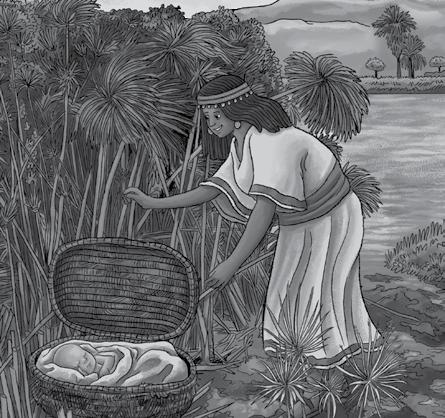
• Are there people in your school, town or village who are treated like they don’t matter? Why do you think that happens?
• How do we know that we belong? To God and to each other?
• What happens in a family or community when someone is treated as if they are not important?

Show the picture in the Children’s Bible while you read the story God saves baby Moses.
• Why did Pharaoh want to get rid of baby boys? What does that say about the world Moses was born into?
• What did Moses’ mother and sister do to protect him?
• Who else helped? (Think about Pharaoh’s daughter.)
• What does this story show us about how God values life? How can people join God in caring for each other?

• If God cared so much about a small baby in danger, what might that say about you and those around you?
• How can we act like Moses’ mother, sister, or even Pharaoh’s daughter: protecting and standing up for those who are small or at risk?
• What could happen in our homes and schools if we remembered every day that each life is important to God and to us?
Phiona Mutesi was a young girl growing up in the poorest area of Katwe in Uganda. Her family was very poor, and her father died when she was very small. At age nine, she dropped out of school because her family could no longer afford to send her. One day when she was not helping her mother sell maise in a stall on the street, the ten-year-old girl visited a chess club in town.
Do you know what chess is? Chess is a game for two players played on a board with 64 black squares and white squares. Each player starts with 16 pieces to move around on the board, according to certain rules. There is a king, queen, rooks, bishops, knights, and pawns. Those are the names of the different pieces, with different shapes, and each one has different rules! The goal is to catch the opponent’s king. It is a difficult game with many rules. Many adults and children play it, and there are world-wide competitions.
When Phiona started playing, people knew she was poor, and didn’t go to school, and were sure she would not manage. People didn’t expect anything from her — but she started to win.
She eventually went to play chess in Russia, but she lost. Phiona returned home, upset and doubting her abilities, but with the support of her coach and the people of Katwe, she started playing again.
Over time, she became so good that she played in big tournaments in other countries. More than that, she began to help other children like her. She said, “You have to believe in yourself. God made you for more.”
God made you for more – what a good message to remember. That was true for Moses, too. And it is true for you.

To help children understand their value to God and others, make a “kindness chain”.
Have them write on strips of paper of some kind something kind a child has said to them, or a helpful deed another child has done for them. (Each child can write as many as they like).
Then gather all the strips together, and with a stapler, tape, or pins, link them together into a chain and put the chain up in the class or in the church.
Talk about how each act of kindness, no matter how small, makes a difference.
Talk about it doesn’t matter how young you are, you are important to God and to others, and you can make a beautiful difference in the world.

To learn that God is always present to teach you. God promises to remind you when there are challenges in your life, that you are not alone.

Ask the children the following questions:
• How do you feel about speaking in front of a group?
• What helps you feel brave when you are nervous or scared?
• Do you think that God can use ordinary people to do big things? Why or why not?

• What would you do if you saw a bush on fire that didn’t burn up?

Show the picture in the Children’s Bible while you read the story Moses and the burning bush.
• Why did God tell Moses to take off his sandals? What does that say about where Moses was standing?
• Why do you think Moses was afraid to do what God asked?
• What excuses did Moses make, and how did God respond to each one?
• How did God show that God would help Moses, even when Moses felt unsure?

• Have you ever made excuses like Moses when you were nervous or scared?
• How can we know that God is with us when we’re asked to do something hard?
• What does this story teach us about how God sees us — even when we don’t feel ready?
One morning, I saw a young couple with a baby at the departure gate of an airport.
The baby was watching all the people around him, and as soon as he saw a human face – any face, it didn’t matter who it was, whether they were young or old, pretty or not, happy, bored, or worried, he smiled with pure joy! It was such a beautiful thing to see.
That moment felt like a little window into heaven.
I was left completely amazed, because in that moment I realised that’s how God looks at us too. He looks closely at our faces just so He can delight in us... I think only God - and maybe a dearly loved baby – can see us like that! (Delight is to enjoy very much.)
It’s like the Bible says in Zephaniah 3:17: “The Lord will take delight in you, and in his love he will give you new life. He will sing and be joyful over you.”

Have some paper and pencils or crayons.
Ask some in the class to draw a picture of a bush in the veld.
Ask others to draw Moses, walking along with his walking stick.
Ask others to draw a bush in the veld with a fire in, burning, and a voice coming from it.
Ask the rest of the class to draw Moses’ face when he sees the burning bush and hears God talking.
When they are all done, ask the children to display the pictures in order as the story happened, first the normal bush, then Moses walking, then the bush on fire, then Moses’ reaction to the fire.
Say: Remember, the fire in the bush helps us to remember God is always with us to teach us. God promised to remind you when there are difficult things in your life, that like Moses in the veld, you are not alone.
Exodus 4 to 12

To understand that God is finally in control – not any king or government, and not even us.

Ask the children the following questions:
• Can you remember the story of Moses up to now? How did Moses and the Israelites end up in Egypt?
• What is a slave?
• Why do you think the Israelites were unhappy in Egypt?

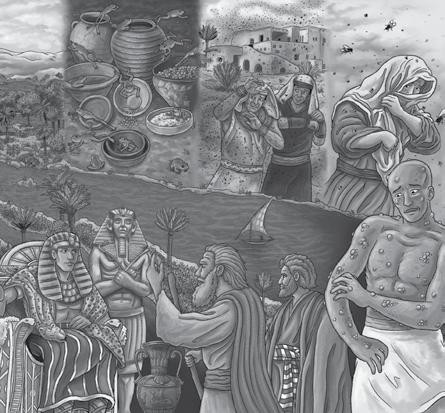
Show the picture in the Children’s Bible while you read the story God frees the Israelites.
• Why was the Pharaoh’s heart hard? Why did he not want the Israelites to leave Egypt?
• God sent the plagues to teach the Pharaoh, who refused to listen to God’s messages through Moses, so that Pharaoh would know that our God is real and powerful.
• How did God protect the people of Israel from the plagues?
• The people of Egypt saw that God was all-powerful. Did the Egyptians believe in Him after this?

• There are still people today who want to compete with God and God’s power. What does it mean when we say God is all-powerful?
• How important is it for us to obey God completely?
• How does God help us to be obedient?
• Pray and ask God for a soft heart.
We should pay attention to the warning notices around us, but sometimes we think that they are not meant for us… like you walk past a house with a sign: “Danger. Dogs inside.” And you open the gate because you think the dogs won’t bite you. Then they do!
Or your parent sees a label on cough medicine that says “Do not drive a car after taking this medicine.” And they think: “O, what can a spoonful of medicine do to me.” … till they fall asleep while driving!
There are some warning signs that we should probably listen to. Here is a story of something that really happened more than 100 years ago, but we still talk about: On 15 April 1912, a big ship, called the Titanic, sank. Six ships passed the Titanic, and they all warned the Captain, Edward John Smith, about icebergs on their route. (Icebergs very big blocks of ice that float in the sea. They are dangerous because they are HUGE under the water where you can’t see, and they float as the waves move, and you can’t control them. They are very heavy, and very sharp. An iceberg might look small when you look at it from a distance, but are often very big).
Five more warnings came on the the next day, three more on the following day, and the day before the ship sank, another seven warnings. All of these warnings were written down and passed on to the officers on the bridge (where the control room is) of the Titanic. Captain Smith, however, was stubborn and he believed that the Titanic was unsinkable. He thought nothing could harm his big, beautiful ship. He ignored warning after warning, and kept going.
Just like the Pharaoh in our Bible story, he paid the price for his ignorance. The ship sank, and almost every one of the 2224 people on the ship landed in the icy water, and many of them did not survive.
God is not an iceberg! But what is true is God is all-powerful, and knows what is best for us. He wants us to be safe and well, but if we ignore Him, we can land in danger. It is unwise to ignore His commandments. We are to obey Him and answer His invitation every day.

Fill a bowl with water. If you can, colour the water to be any colour with some juice, for example, or food colouring. Take a few soft and hard objects (like a sponge, a piece of cloth or a washing cloth, a stone, a piece of iron). Have the children put the objects into the water and decide if each subject is hard or soft.
Put the soft items on one side, and the hard items on the other side.
Squeeze the soft items. What is inside them? (water!)
Squeeze the hard items. What is in them? (nothing!)
If God’s teaching is like the coloured water, did the hard or the soft items drink the water? Which items have water? Which items have no water in them?
Say: “Can you see, like these items we put in the water, our hearts can be hard or soft. Our hearts can be filled with God or it can remain empty of God. Soft hearts are happy to learn something new, soft hearts are willing to listen to God. Hard hearts think they know everything, hard hearts don’t want to change or listen to God’s way or God’s plan.
Which kind of heart do you want to have?”

To know that God makes a way, even when there isn’t one.

Ask the children the following questions:
• Have you ever felt stuck — like there was no way forward, and you didn’t know what to do?
• What does it feel like when you are scared and don’t know how things will turn out?
• Who do you turn to when there seems to be no solution?
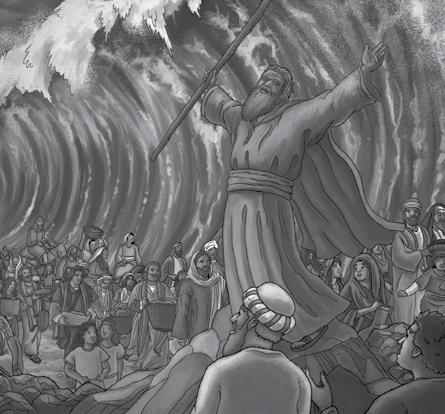
• What are some things in life that can feel like “a wall” in front of us? Those things we can’t get past?
• Do you know someone who had a big problem, but didn’t give up? What helped them keep going?
• What do we hope for when it feels like we’re trapped, with no way out?

Show the picture in the Children’s Bible while you read the story Crossing the Red Sea.
• What was the biggest danger for the Israelites in this story? What do you think they felt standing in front of the sea?
• What did Moses do when the people were afraid?
• What did God do?
• What does this story tell us about the kind of God who makes paths through deep water?

• What might it be like to trust God when we feel stuck or afraid?
• Can you think of something in your life right now where you hope God will make a way?
• How might this story help us to walk forward? Even if we don’t yet see the path?
Malala Yousafzai was a young girl in Pakistan who loved going to school. She was the oldest of three children, and her father was a teacher. Even as a baby she enjoyed going to school with her father! But one day people came who said girls should not learn. They told her to stay home. She kept going to school anyway.
At age eleven she was speaking out about girls who also wanted education. Nothing stopped her, even at that young age!
One day four years later she was attacked and badly hurt. On 9 October 2012, fifteen-year-old Malala was on the bus returning from school with her friends. Two members of the group who don’t want girls to learn stopped the bus and asked, “Who is Malala?” They got her off the bus and hurt her badly. It seemed like there was no way forward for her. She was in hospital with bad injuries for a long time. She still has the scars.
But she survived and she kept speaking up. She won the Nobel Peace Prize at age seventeen for standing up for girls’ education.
Malala said: “When the whole world is silent, even one voice becomes powerful.” Malala’s story reminds us that even when things seem blocked or broken, a new path can begin. God can still make a way.

You will need some small sticks (from a tree or shrub), some string or wool, and other bits that you think might build a bridge. If you have some raw spaghetti, that will also work.
Tell the children that today they will be building a bridge that will hold a toy car, that you have with you. They must build the bridge with the sticks and bits and pieces that you supply. It must be a strong bridge, to hold this toy car. They can try as many times as it takes, and they can work together.
Children can work alone of in groups. See who finishes first, and check that it can take the toy car.
Talk about God who is always with them, and even when they face difficult situations, He can help them find a way through. Remind them of Isaiah 43:1-2:
Do not be afraid—I will save you. I have called you by name—you are mine. When you pass through deep waters, I will be with you; your troubles will not overwhelm you. When you pass through fire, you will not be burned; the hard trials that come will not hurt you.
(Help them know this is poetry, and means in difficult times God will be with us. They must not step into a real fire!)

To understand that God gives us rules so that we can live happy, healthy, and strong lives.

Ask the children the following questions:
• What’s the best rule at your school?
• What’s one rule you wish didn’t exist?
• Do you think people need rules to live by?
• If you could make one rule that everyone in the world had to follow, what would it be?
• Why do you think rules can help us enjoy life more?

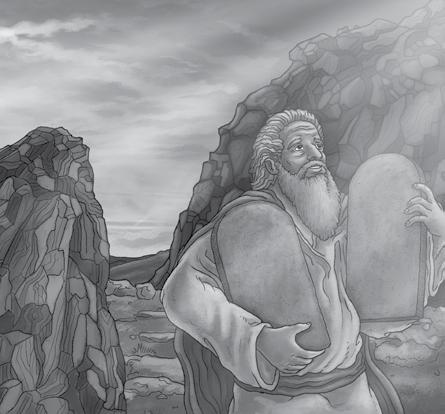
Show the picture in the Children’s Bible while you read the story The Ten Commandments.
• How long had the Israelites been traveling in the desert before they reached Mount Sinai?
• What is the first thing God tells the people in the commandments?
• Which commandments are about loving God, and which ones are about loving other people?
• Can you name two or three of the commandments?
• Why did God give the ten commandments to His people?
• What do these commandments tell us about what God is like?

• What happens when people don’t follow these rules? How does it hurt others?
• How can we show God that we love God in our everyday choices?
• What are some ways we can respect others this week at home or school?
When I was a little girl, I loved to play with my friends across the street.
One day my mother told me to wash the dishes, and I could go and play later. But I was in a hurry. My friend had sweets, and I didn’t want her to finish them before I got there!
When my mother left the kitchen, I quickly opened the tap so that she could hear the water running. Then I took the dirty dishes and put them in the cupboard, behind some clean dishes so that I would not be caught being naughty.
Then I quickly ran across the street to my friend’s house, thinking I was very clever. We played and ate her sweets, and had fun, until it was time to go home.
A week later I came home from school, and my mother was waiting for me. Her face had no smile, and she was very angry. She needed a bowl for the stew she was cooking, and went to look in the back of the cupboard. What did she find? The dirty dishes that I had hidden, full of ants!
Let me not tell you what happened next, but I am sure that you can guess. Let me just say that I learnt that rules are there to be obeyed. It doesn’t work to avoid them.
Mother knows better. And in the big scheme of things, God knows better. God knows it is good for everyone when you honour your parents.

Ask the children to listen to your instructions, and when you tell them something they must do, they must stand. If you tell them something they must not do, they must sit.
Start with:
Put your hands on your head (they stand and put hands on their heads)
Don’t laugh (they sit down)
Stand on one leg (if you can) (stand)
Don’t close your eyes (sit down)
Now we will do the exercise with the commandments or rules of God:
• I am the Lord you God. Only worship Me.
• Only use God’s name to praise and thank God.
• Don’t curse and use God’s name.
• Remember to rest on Sunday and to worship God.
• Honour your parents and grandparents.
• Do not kill.
• Respect all living things.
• Always love your family, even when you argue.
• Don’t steal.
• Don’t tell lies about others.
• Only tell the truth about other people.
• Don’t envy what belongs to others.
• Be happy with the things you have.
Joshua 2

Even if you have a sinful past, God can change you and use you to be an important part of God’s work.

Ask the children the following questions:
• Have you ever been afraid? How did you show courage when you were afraid?
• Can you think of people who showed courage when they may have been afraid?
• Do you believe that God can use sinful people?
• Can people really change?

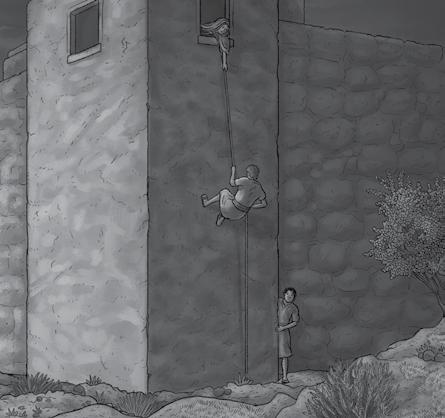
Show the picture in the Children’s Bible while you read the story Rahab helps the Israelites.
• Why did Rahab help the spies? What did she want in return?
• Rahab doesn’t look or sound like a believer. Or does she? How did she change?
• Do you think the two spies trusted that God would protect them from the King’s men? Would you have trusted God to protect you?
• Have you ever been afraid? Why were you afraid? Have you ever been afraid to obey God?
• Why did God save Rahab? Do you know whose great-great grandmother she was?

• God can really change people. Just because you did bad things in the past, doesn’t mean that God won’t be able to use you. Can you think of people who were changed by God?
• There are a lot of people in your community who are courageous and help keep you safe and protected. Like doctors, emergency workers, and nurses. Write a letter to one of them thanking them for their service.
• Pray that God will help you to be courageous and obey God.
A long time ago in a far-away country two brothers were caught, stealing sheep. The judge punished them severely. Not only did they receive a ten-year prison sentence, they were also marked on the forehead like animals, with the letters “ST” - sheep thief. The judge wanted everyone to know what they did.
After 10 years, they were freed from prison. The one brother ran to another country—he could not face the people he knew. He died as a thief in a foreign land. He was always unhappy because the “ST” made him stand out, and he had very few friends.
The second brother chose to return home. He was a changed man. He would always tell people “I made a mistake. I know I hurt a lot of people, but I will stay here and I will try to make up for everything. From now on I will always try do what’s right and win back the respect of the other people in town.”
The years passed, and he became known for his wisdom, his honesty and goodness. People came to visit him for the advice he could give, especially those who made mistakes.
One day two children, playing in the street, saw him coming, walking down the road. He was an old man, now. It was many years since he came out of prison. One of them noticed the letters, “ST” on the old man’s forehead, so he asked his friend if he knew what that meant.
The other one said: “I really don’t know, but I heard my parents speak about all the good that he has done, so I think the letters stand for “Saint.” (A saint is very good and kind, who often helps others and loves God.)

Start by choosing one child to play the “outsider” from the group. Secretly prepare him or her. Give them a packet of little sweets, enough for one each for the whole class. She or he must keep it in a pocket or a little bag, so no one knows what she has.
Now let the class form a circle and hold hands. Their job is, when the “outsider” comes near, they must close up the circle so the outsider child can’t get through. The aim of the game for them, is to keep the child out.
After some minutes you can call out: “Let her in! Let her in!” As they let the child into the middle of the circle, she or he hands each child in the circle a sweet. Talk about:
• Why are we so scared of people who are different?
• How did the different child bless the rest of the class, when you let him or her in?
Say: “Maybe you look different from everyone else, maybe your family is not as rich as others, or maybe your family member is in prison, or maybe you failed a year in school, or maybe you need a stick to walk, or maybe you struggle to say some words, or maybe you come from another country ... But the woman in the Bible, Rahab, teaches us, when you are different, you can still do God’s work, and you can still bless other people!”
Joshua 5 and 6

We consider that it is better to do things God’s way rather than to trust our own means. We learn about the value of prayer.

Ask the children the following questions:
• Have you ever tried to solve a problem your own way, only to find it didn’t work?
• What do people around you do when they feel powerless or afraid? Do they fight, shout, stay quiet or pray?
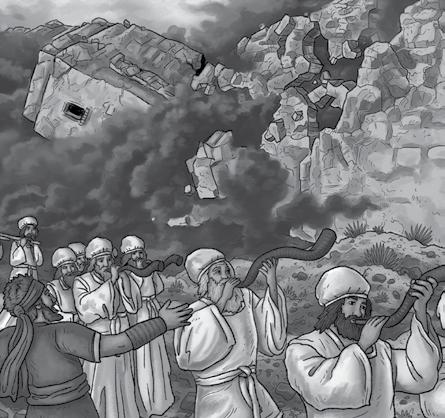
• What are some “weapons” people use today? Not just tools or guns, but attitudes, words or actions?
• When does trusting God feel harder than just doing things your own way?

Show the picture in the Children’s Bible while you read the story The walls of Jericho.
• What was strange about God’s instructions to Joshua and the people? Was it the kind of instruction you would expect in a battle?
• Why do you think God asked them to walk and blow trumpets, instead of using weapons?
• How do you think the people felt while marching quietly day after day?
• What does this story show us about what happens when people listen to God and trust Him, even when it seems foolish?

• When you are in a tough situation, what will it ask of you to stop relying on your own strength and trust God instead?
• What kind of walls do we face today? Problems, anger or fear that won’t fall by shouting or fighting?
• What might happen if we face problems with prayer, listening and trust instead of weapons?
Leymah Gbowee lived in Liberia in North Africa during a long and terrible war. She grew up living with her parents and three sisters in the city Monrovia. The war lasted fourteen years, so you can imagine that many people died, many were hurt, and many were sad for losing their family in the war. That made them hurt and angry, so the war just continued because if you get hurt, you want to hurt the one who hurt you (you know how that is).
What could stop the people fighting? Nothing seemed to work. Would they carry on with the war forever? Leymah was tired of people being fearful all the time.
One night in 2002 she awoke from a dream where she says God had told her, “Gather the women and pray for peace!”
Leymah gathered women from different backgrounds and they prayed for peace. Every day they met, dressed in white, and sat quietly. People laughed at them. Some shouted at them. But they didn’t give up.
One day, the war leaders agreed to talk. While the male leaders were talking and arguing inside, Leymah, her friend Ellen, and many other women sat outside the room, waiting and praying, until the negotiators came to a peace agreement. Peace came in 2003. Leymah said, “We had no guns. But we had God, and each other.”
Leymah later won the Nobel Peace Prize for her work. Her friend, Ellen became the President of the country! If you can, go and research her. Ellen became the first woman in Africa to be elected as President of her country.
Leymah and Ellen’s story shows us that trusting God’s way can bring peace that weapons never can, even when it’s quiet, slow and hard.

You will need a sheet of paper for each child (remember, it can be the back side of a used piece of paper – as long as it doesn’t contain personal information). Also sweet, crisp, or biscuit wrappers you get from the rubbish bin, One or two pairs of scissors for the children to share, glue for them to use, Before class you cut out for each child a picture of praying hands about 10 cm high from black or white paper.
Say: The Israelites walked around the wall. Leymah and her friends sat outside waiting and praying. What are the Godly weapons we can use as children of God, to fight? The most important weapon is prayer.
Philippians 4:6,7: “Don’t worry about anything, but in all your prayers ask God for what you need, always asking him with a thankful heart. And God’s peace, which is far beyond human understanding, will keep your hearts and minds safe in union with Christ Jesus.”
Draw the shape of a church window on paper for each child (about 15 x 25 cm).
Give the children the wrappers you have collected, and let them cut them in small bits, in different shapes. When they then stick the little papers in the outline of the window, it begins to look like a stained-glass window. At the end, you give each one the praying hands picture that you cut out, to stick in the middle of the window on top of the coloured paper art work.

To learn that God is not silent, but still loves to speak to us even today, even as children.

Ask the children the following questions:
• Whose voice do you hear the most each day?
• Can you tell who’s calling you without seeing them? How? (Tone, voice, words?)
• Do you know what your name means or why you were given that name?
• Do you think God still speaks to people today? What might that look/feel like?
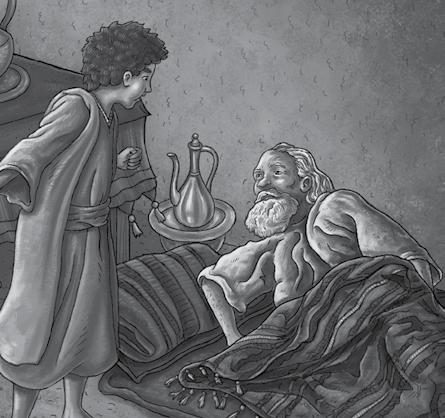
• If God wanted to tell you something, how do you think you would hear it?
• Who helps you learn to listen to God or make good choices?

Show the picture in the Children’s Bible while you read the story Samuel listens to God.
• Where did Samuel live, and who was he helping?
• What happened in the middle of the night?
• What did Samuel do the first time he heard the voice?
• What message did God give to Samuel?
• What kind of person did Samuel grow up to be?
• What does this story show us about how God speaks to people?

• God spoke to Samuel when he was still a child. God can speak to you, too. What are some ways we can practice listening to God—at school, at home, or in church?
• Sometimes we’re afraid to do what God asks. What can help us be brave like Samuel?
“Mr Watson, come here – I want to see you.”
Those were the very first words ever spoken over a telephone! Alexander Graham Bell said them on 10 March 1876, using one of the first telephone models he had built. His helper, Thomas A. Watson, was in another part of their laboratory and he actually heard Mr Bell’s voice through the other device!
Watson quickly came to Bell, proving that the invention worked. That means Watson was the first person in history to ever receive a phone call!
Mr Bell was not even trying to invent a telephone. He had a mother and a wife who were both deaf. So, he spent a lot of time researching hearing and speech. Eventually, his years of experimenting with sound and the human voice led to the amazing invention that changed the world.

Have the children sit in a circle. Then whisper a short promise from the Bible (like God says: “Do not be afraid”), in the ear of the child next to you. Let that child whisper it to the next, and so on, around the circle, till it comes to the child next to you, who says the message aloud.
Tell the children what your original words were.
Say: When God speaks to us it is a little bit like this. We must listen carefully, to know what God is saying. Sometimes it’s like God whispers into our hearts, sometimes a verse from the Bible talks to us, sometimes a parent or a teacher or preacher or a friend can pass on God’s message to us.
1 Samuel 9; 10 and 16

To understand that God does not judge as people judge, God looks at the heart.

Ask the children the following questions:
• How do you feel when you want to eat a really goodlooking fruit or cake, but then when you take the first bite it is completely bad on the inside?
• What does the saying “Don’t judge a book by its cover” mean?
• Why should we not judge people on the way they look on the outside?

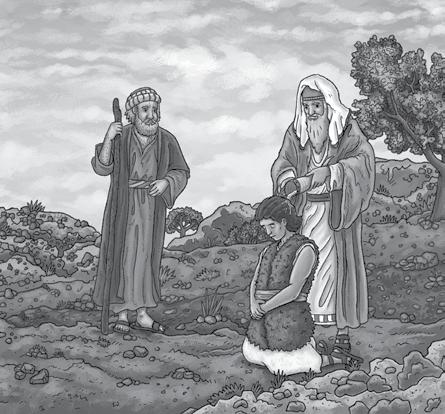
Show the picture in the Children’s Bible while you read the story Samuel anoints David.
• Why did Samuel think Jesse’s oldest son would be the new king?
• We tend to look at how people appear on the outside. But what does God see? Is it possible to see what God sees?
• Why was David not with his other brothers when Samuel came to visit?
• Why do you think God chose David?
• Do you think Samuel was surprised when God chose David as king?
• How do you think David felt when Samuel told him he was God’s chosen king for Israel?

• What does God see when God looks at you?
• What kind of heart pleases God? What is a person like whose heart pleases God?
• What do you think pleases God about your life?
• Do you agree that followers of Jesus should see everyone as valuable and important? How does that change the way we treat other people?
Throughout the Bible we find God choosing people for God’s service who are not the obvious choice, people we would have said, are not right or good enough, for one reason or another:
Moses couldn’t speak well.
Jacob told lies.
Joseph was a dreamer.
Gideon believed he was the least of everyone; he had no belief in himself.
Timothy might have had ulcers – he stressed too much.
Abraham was too old.
Naomi was a widow.
Ruth was a refugee/immigrant from a foreign country.
Jonah was very disobedient and ran away from God.
Mary was very young when she had baby Jesus.
Peter was a loudmouth.
John and James were “the sons of thunder”.
Thomas doubted.
Martha was a worrier and nagged the whole time.
Paul was a persecutor of the church.
David was too young.
These are not the types of people we would expect God to choose for God’s purposes.
But then the Bible tells us that God does this many times… God works with the following principles:
• God does not judge like people judge; He looks at the heart. (1 Samuel 16:7).
• God deliberately chooses people that you and I and the rest of the world will overlook, because the people God chooses will trust in God, and not in themselves.

Give each child a piece of paper or board to draw on and some pencils or crayons. Let them, in big letters write and decorate the paper to put in their house or room as a reminder:
1 Samuel 16:7
1 Samuel 17

We remember that it is not how big and strong you are, but how big and strong God is.

Ask the children the following questions:
• Have you ever felt small or weak compared to someone else?
• Have you been in a situation where it felt like no one believed in you?
• What do you think makes someone truly strong?

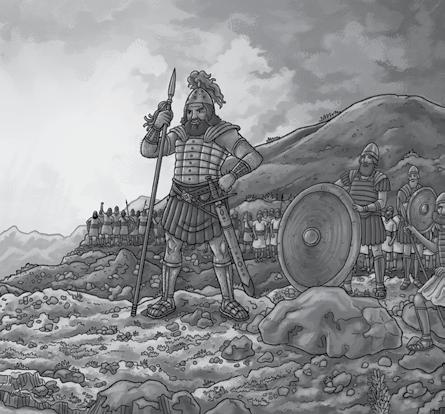
Show the picture in the Children’s Bible while you read the story David and the giant.
• What are some things that might feel like “giants” to children? Things that feel too big or scary?
• When others are bigger, louder or stronger, what helps you to not give up?
• What was everyone afraid of in this story?
• Why was David not afraid even though he was younger and smaller?
• What did David say about who would win the battle? Was it because of his strength, or God’s?

• What might change if we looked at our problems the way David looked at Goliath?
• When you feel small, how can you remember that God is big and near?
• What do you think God might be able to do through someone like you?
Tani Adewumi was just 8 years old when he and his family had to leave Nigeria and live in a homeless shelter in the USA. He had no home, no toys, and no money. He learned to play chess at school. He was smaller and poorer than the other children, but he believed God had given him a gift.
In one year, he won the New York State Chess Championship for his age group, against kids with private coaches and training. The world chess champion heard about Tani, and praised him. The President of America invited Tani to visit him, and Tani took a trip to the American White House!
He said, “God made me for something. I just have to keep trusting.” Tani’s story shows that you don’t need to be big or rich or powerful. You just need courage, trust and God’s help. A book was written by him, called My Name Is Tani ... and I Believe in Miracles.

Take a measuring tape to Sunday School, and a pencil. If you have sticky labels or papers to stick on the wall, that will also help.
One by one, measure how tall the children are, and put a note on the wall at their height, with their name and how tall they are, for example Sipho 94 cm. Do this for each child.
Also let them measure you! They might have to stand on a chair or a table to do that, or you can lie flat on the floor to be measured! Put a note on the wall where you measure.
Then add a marker for the tallest person living in the world today: Sultan Kösen in Türkiye who is 2.51 meters.
Then Goliath in the Bible — 2.97 meters.
Now discuss how big you think God is.
Talk about if you and God stand together, what can scare you?

To learn about King Solomon’s story, to learn what it means to be wise, and learning the value of wisdom.

Ask the children the following questions:
• If someone gave you one wish, what would you ask for?
• Have you ever asked God for help with something hard? What was it?
• What makes someone wise? Can children be wise too?
• Do you think it’s better to be smart, kind or rich? Why?

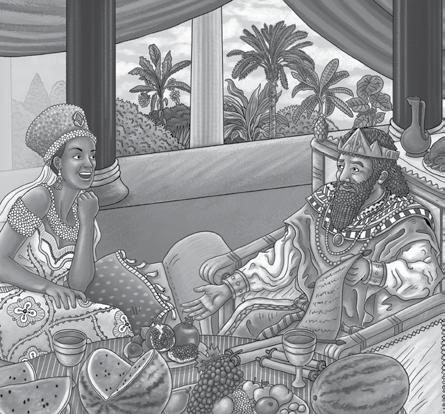
Show the picture in the Children’s Bible while you read the story of Solomon, the wise king.
• Who was Solomon’s father?
• What did God say to Solomon in a dream?
• What did Solomon ask God for?
• Why was God pleased with Solomon’s answer?
• What important building did Solomon build in Jerusalem?
• What did the Queen of Sheba say after seeing Solomon’s wisdom?

• What can we learn from the way Solomon prayed to God?
• How can we ask God for wisdom when we’re confused or unsure?
• What’s one decision you need wisdom for this week?
Once there was a very rich man who had very sore eyes. It hurt all the time, and he didn’t know what to do. He saw many doctors, took lots of medicine, and even had many injections - but nothing helped. In fact, the pain just got worse.
One day he called for a wise man who was known to help people in unusual ways.
The man listened carefully to his troubles and said, “Here’s what you need to do: only look at things that are green. Don’t let your eyes see any other colour.”
The rich man thought, “Well, that sounds strange… but I’m in so much pain, I’ll try anything!”
So, he hired painters and bought huge barrels of green paint. He told the painters to paint everything green: his furniture, the walls of his house, the garden, the floors… everything his eyes might see!
A few days later, the wise man came back to visit. When the man opened the door he shut his eyes, and wouldn’t look at the wise man. Why? Because he was wearing a red coat. The rich man’s servants saw him and shouted, “Quick! Bring the green paint and cover him in it before the master can look at him and get eyesore again!”
The wise man started laughing and said, “Oh dear! You didn’t need to paint the whole world green!” Can you guess what he said? “If you had just bought a cheap pair of green sunglasses, your eyes would only have seen green, and you would’ve saved your money, your house, and a lot of trouble!”
Then he said something very wise: ‘You can’t paint the whole world to fit you. But you can change the way you see it’.
After reading or telling this story, say:
What was the wise man trying to say? Don’t try to change everything around you.
Start by changing yourself.

Form small groups. Give each group a made-up simple problem (e.g. two friends want the same toy, or someone is being left out).
Let them act out a short scene and come up with a wise solution like Solomon.

We learn that God will stand with you.

Ask the children the following questions:
• Have you ever made a choice that turned out to be bad? How did you feel about yourself? How would you have felt if you made the right choice?
• Why is it so difficult for us not to give in to temptation?
• What is “peer pressure”? What is the difference between the pressure from “good” friends and “bad” friends?

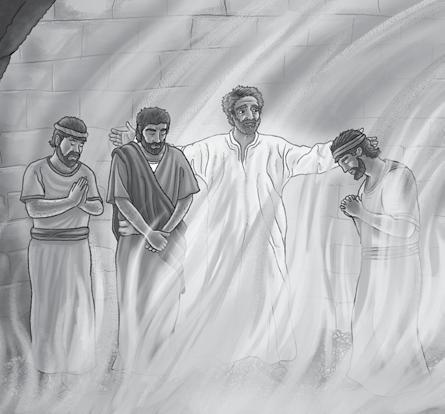
Show the picture in the Children’s Bible while you read the story In a blazing furnace.
• How do you think Meshach, Shadrach and Abednego felt when they decided to not bow down to the king’s idol? And when the king had them thrown into the fire?
• Who do you think the fourth person was, standing in the fire with the three men?
• They did this because they wanted to obey God. When have you done something hard so that you could obey God?
• How can you know that God will never have you standing alone?

• What did the king learn about God from this event?
• How can we trust God’s protection in any situation, even when we don’t see a way out?
• How does it help you to stand up against peer pressure when you know that God will never leave you alone?
• Who are the people in your life that you can turn to for support and encouragement during challenging times? How can you be a source of strength for others in your community?
In 1982, a very big aeroplane crashed into a river! It was a horrible day. The airport was closing due to ice and bad weather. The aeroplane sat on the runway for 45 minutes with ice forming on the wings before they tried to take off, but they only got a little way off the ground before the plane slammed into a bridge over the river, a kilometre or so away from the airport runway.
People from the plane were now in the icy cold river, crying out for help, but with the storm and the traffic on the road, emergency vehicles could not get to them.
Cars stopped on the bridge, some people tried to help by throwing in ropes to the survivors to try and pull them out. People looked on in fear as one of the survivors could not hold onto the lifeline and began to sink. They began to shout and scream, but what could they do?
Fortunately, Mr Lenny Skutnik was there. He would not stand by and do nothing. Without waiting, he jumped into the cold water to start the rescue. So, he swam first to a woman. He saved her and received a medal for saving her.
Sometimes in life it feels that we are drowning in troubles or worries. When we are sinking deep in trouble and we need help, we don’t know who to call. Sometimes friends may help, but often we need someone who knows better. Someone who understands the situation and who is willing to jump in there with us!
That is who Jesus is for us. If you want to know what God says most often in the Bible, one of the things you’ll find is these words: “Do not be afraid. I am with you.”

You will need paper and pencils, paint, or crayons.
Invite children to draw a picture of something scary, like the fire the three men in the Bible were in, or a high mountain you think you have climb alone, or a wild river, or a storm on the sea.
On the back of the paper, write some things you are scared of. Maybe a bully at school, or an angry adult, or the dark, or exams….
Now go back to the picture and do 2 things:
Write on the picture “Don’t be afraid! Stand your ground, and you will see what the Lord will do to save you today” Exodus 14:13
Then draw a white dove on the picture. A white dove is the picture we draw to show that God’s Holy Spirit is with us.
Now that your picture is finished, you can pray about the things you fear, and ask God to help you depend on God, and not to be afraid.

We remember when we face difficult things in life, we are not alone. God is with us, and we can win the battle.

Ask the children the following questions:
• What makes it hard to pray sometimes?
• How do you know someone is really listening to you when you are talking?
• Who do you talk to when you’re worried or scared?
• Have you ever asked God for something and had to wait a long time for an answer?
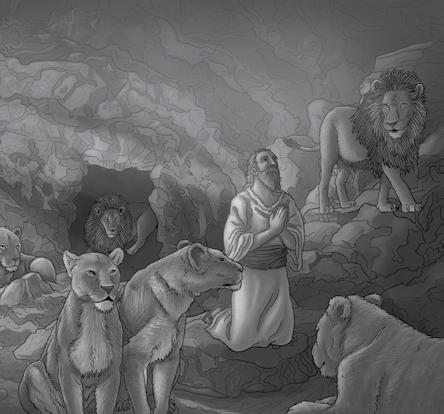
• What do you think would change in your life if you believed God hears every prayer?

Show the picture in the Children’s Bible while you read the story Daniel and the lions’ den.
• Why did Daniel keep praying, even when the king said it was not allowed?
• What do you think Daniel prayed about when he was in the lion’s den?
• Did God hear Daniel? What happened?
• What does this story show us about how important prayer was to Daniel and to God?
• How much do you think, did Daniel believe in God? What proves it?

• If God heard Daniel, what does that mean about the times when you pray?
• How could you make prayer a part of your day, like Daniel did?
• Who do you know that needs to hear: “God hears your prayers”? How can you tell or show them?
Mary Jones was a girl in Wales who loved God and wanted her own Bible in her language. But Welsh Bibles were very hard to find and very expensive. Her family didn’t have much money. Everything they had, they had to use to buy food.
She started praying and saving money when she was ten years old. Mary sold honey, did babysitting, and picked up fire wood for her neighbours to make money to save for the Bible. When she was sixteen years old, she finally had enough. She walked a long way to the next town to buy a Bible. People were amazed by her faith and prayer.
Mary’s story helped start Bible societies that give Bibles to people all over the world. Mary said, “I prayed to God every day that He would help me.” Mary’s story shows us that even quiet prayers can move hearts and open doors, because God is listening.
Having to save so much money was a giant in Mary’s life, but she did not feel overwhelmed by the challenge. She kept on until she succeeded.

Divide the children into two teams.
All the children scatter around in an area that you designate. One child on each team is appointed to be the “angel” and the rest of the children on the team are the “lions”.
To begin the game, tell the “lions” to open their mouths and roar.
The child who is the “angel” will then go to each member of his team and touch him/ her. When the angel has touched a “lion”, he/she will stop roaring and lie down on the floor with their eyes closed.
See which team can shut all the “lion’s” mouths first.
Then you can play the part of the king, and stand among the sleeping lions, and say:
I am King Darius. Greetings! I command that throughout my empire everyone should fear and respect Daniel’s God.
“He is a living God, and he will rule for ever.
His kingdom will never be destroyed, and his power will never come to an end.
He saves and rescues; he performs wonders and miracles in heaven and on earth.
He saved Daniel from being killed by the lions.” (Daniel 6: 26-27)
Esther 3 to 9

We learn about trusting God, even when we have something difficult to do.

Ask the children the following questions:
• If you were in a film about courage, what would do you imagine your character have to do?
• What would you do if you saw someone being treated unfairly on the playground?
• Draw a picture of what “courage” might look like: a person – just a symbol or animal.
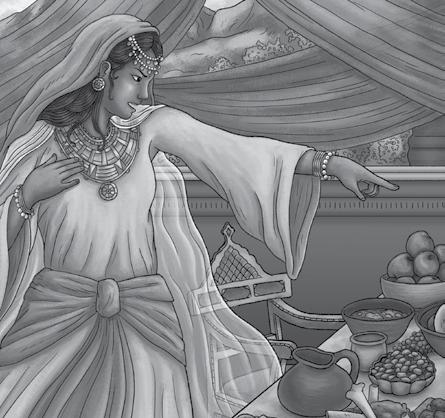
• Can you think of a time when you knew the right thing to do, but it was very difficult?

Show the picture in the Children’s Bible while you read the story Esther risks her life for her people.
• Who was the king of Persia in this story?
• Who was Esther, and what secret was she keeping?
• Why was Esther afraid to go to the king?
• What did Esther and the Jews do before she went to the king?
• What happened when Esther went to the king?

• What can we learn from Esther about standing up for others?
• Why do you think God wants us to be brave?
• Who in your life helps you be brave and trust God?
• Do you think God has placed you somewhere – like Esther – for a reason? Where?
This story is about a man named Dwight Moody. He lived a long time ago – he was born in 1837.
When Mr Moody was 17 years old, he worked in a shoe shop. He gave his life to Jesus and felt that God was calling him to become a full-time preacher. So, he left his job at the shoe shop and started preaching.
But then something terrible happened. A big fire broke out, and he lost everything he owned. He was shocked and very upset. He didn’t understand why this had happened.
That’s when his friend, Henry Varley, said something powerful to him. He said:
“The world has not yet seen what God can do through someone who fully trusts Him, obeys Him, and gives everything to Him.”
He started to to spend his time in Sunday school work with children and work with young men in need. In the American war, Moody worked among soldiers while he continued with Sunday schools. He also started a street church where he could preach to many people.
Later Mr Moody sailed to the British islands to preach the message of Jesus. When they counted, he reached more that 2.5 million people with the message in Britain.
Dwight Moody preached to millions of people in his lifetime, and always had a deep interest and loving concern in bringing the gospel to children.

Divide your class in teams of two. One of the two is blindfolded with a dish towel, a tie, or a piece of cloth. Then you put chairs or other objects around the room as obstacles. Then the teams of two hold hands and the seeing child leads the blindfolded child around the room.
After a few minutes, let them switch places so that the other child now leads (and you rearrange the obstacles).
Then, when they are all seated again, ask:
• What did it feel like to be led, blindfolded? Did you trust your partner?
• What did it feel like to lead someone who couldn’t see? Why did you or did you not lead them into an obstacle?
• How does it feel to trust an adult person in your life?
• Do you think people can trust you?
• What is it like to trust God?
Matthew 1:18-25; Luke 1:26-38 and 2:1-21

Jesus, who is God’s Son and who became human like us, is our greatest gift!

Ask the children the following questions:
• What is the most amazing gift you have ever received?
• How do you think Mary felt when she got to the stable?
• Can you imagine what it was like to see a whole choir of angels appear in the sky?
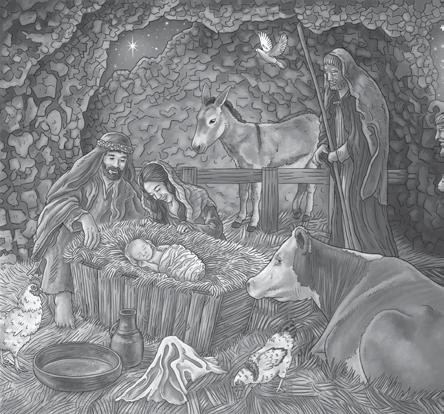
• What would have been going through your mind if you were there?

Show the picture in the Children’s Bible while you read the story Jesus is born in Bethlehem.
• Joseph and Mary lived in Nazareth. Why did they walk all the way to Bethlehem? What is a census?
• Why was Jesus placed in a manger after He was born?
• What did the shepherds do after they saw Jesus? Why did God choose humble shepherds to be the first witnesses of Jesus’ birth? What does this tell us about God?

• Why is Jesus the greatest gift we have ever received? How can we share this Gift?
• How did Jesus’ birth change everything?
• How does this story and the next one about wise men, show that God’s love and grace is meant for all people—regardless of whether they are important, or poor and unimportant, where they live, or where they come from?
• The shepherds went home praising God. Why? What makes you praise God? How do you do that?

Give each child a handful of mud.
Ask them, with this mud, to make something that reminds you of Jesus. When they are done, ask them to show the class what they made.
Say: Now, look around. Whose hands are the dirtiest? The dirtiest child gets a prize! Take your item that you made home carefully, let it dry out and put it somewhere where you can see it every day, to remind you of Jesus.
You ask how mud can remind you of Jesus? Let me tell you:
What is your idea of Jesus? Can you describe his face, his eyes, his hair? Look at the Bible to make a picture in your head of Jesus:
Revelation 1 helps one to see him with white hair and fiery eyes, a voice like a waterfall and a gold belt round his waist.
John 10 brings a picture of a shepherd, strong, carrying the lambs.
Matthew 26 shows a picture of sad eyes, a crown of thorns, and drooped shoulders.
When I read John 1, I see Jesus with dirty, muddy hands. John 1:3: “Through him God made all things; not one thing in all creation was made without him.” It was through Jesus that God created everything there is. Can you picture Jesus maybe shaping a mountain after everything had been created, like Table Mountain in Cape Town, just smoothing it off for us?
Can you picture Jesus taking soil from the ground, and shaping Adam – adding a bit of soil here to make his chest larger, taking away a bit to make his fingers just big enough to pick up a weight, but small enough to manipulate little things…. getting his hands dirty before he breathed into Adam’s nostrils.
Jesus with dirty hands. He’s no distant God. He’s involved with his creation. Since forever.
When he came to us via a dirty stable, or mixing mud in his hand to heal the blind man, or bending down low to sit with children in the dust, no one recognised him. Hardly anyone welcomed him. But he came anyway, and allowed his hands to get dirty as he did what humans do.
This is the wonder of Christmas: the Word became a human being and lived among us, says John chapter 1:14.
He comes close— close enough to get his hands dirty while he sits with you and whatever you are doing.
Jesus isn’t just for Christmas. He is for every day.
Jesus isn’t just for church. He’s for everywhere.
Let him go home with you. Talk to him every day. Ask for his help in everything you do. And keep your eyes open to see where you can help him, too.
Jesus isn’t only where there’s sparkle and presents. He’s also in the mud with us.


To understand that Jesus came for everyone.
Ask the children the following questions:
• Have you ever felt like you don’t belong or that others are more important than you?
• What does it feel like to be welcomed and included? Can you think of someone who is often left out? Maybe in your class, town or village?
• Do we sometimes treat people who are different from us as if they don’t belong?
• What kind of world would it be if we believed everyone was part of God’s family?

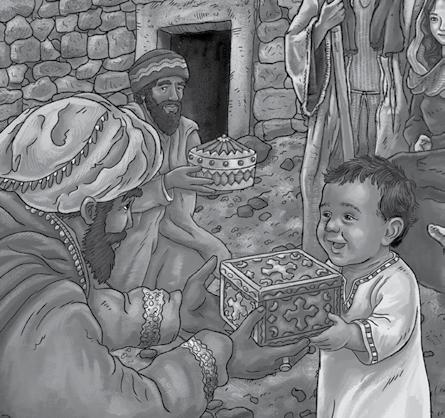
Show the picture in the Children’s Bible while you read the story Wise men visit Jesus.
• Who were the wise men? Were they part of Jesus’ people, or from far away?
• Why do you think they wanted to visit this baby?
• What does it tell us that God used a star, something in the sky, to invite people from another land?
• What do we learn about Jesus from this story, even when he was little, before He could speak?

• If Jesus came for everyone, what does that say about you and your neighbour, and even strangers?
• How can we make others feel included and welcome in the way Jesus does?
• Can you think of someone who needs to know: “Jesus came for you too”? How could you show them?
Desmond Tutu grew up in South Africa when laws kept people apart because of their skin colour. Some people were treated as if they didn’t matter, but he believed God made everyone in His image.
Desmond Tutu, as a young boy, met Rev. Trevor Huddleston while he was walking with his mother. In the apartheid era in South Africa, black people were expected to step aside for white people. But Rev. Huddleston, a white man, surprised them by stepping off the sidewalk and taking off his hat out of respect to Desmond’s mother as he passed. This made Desmond think about what people are worth, and that God equally loves all people. That means for us, that we should respect every other human being, too. No one is too important to be kind and respectful to other people. No one is too humble to be loved and respected.
This one little thing that happened on the sidewalk in the street changed Desmond’s life. He became a church leader who said, “God’s family has no outsiders.”
Desmond Tutu helped people of all backgrounds see that Jesus came for rich and poor, black and white, old and young, men and women. Even after being treated unfairly, he kept saying: “Each person is a V.I.P. — a very important person to God.”
The work that he did in his country and in the church taught millions of people to be better at including everyone.
Rev. Desmond Tutu’s life reminds us that Jesus didn’t come for only one kind of person. He came for all people, everywhere.

Ask the children to form groups as quickly as possible every time you you call out a new instruction:
Some children will land in a group; others will be excluded. We will talk about how it felt to be included or excluded, at the end of the game. Each time you give an instruction, give the children time to form groups, and take note of those who did not make it into a group.
• Form a group of six children.
• Form a group of the three tallest children in the class.
• Form a group of five people wearing white shoes.
• Form a group of people wearing green or white shirts.
• Find a person who shares your birthday month.
• Form groups of four people who go to the same school.
• Form a group of all the people who speak the same language at home.
• (add criteria that will suit your group)
• Talk about: What did it feel like to be left out?
• Who in our community do you think, feels left out sometimes?
• What can we do to act more like Jesus, and include everyone, even if they are very different?
Luke 2:41-52

To learn that Jesus loved and obeyed his parents, and we want to do the same.

Ask the children the following questions:
• Have you ever gotten lost or been separated from your parents in a busy place?
• If you could spend a whole day in any building (school, library, shop, church...), which one would you pick and why?
• What’s the most interesting thing you’ve ever learned at school or church?
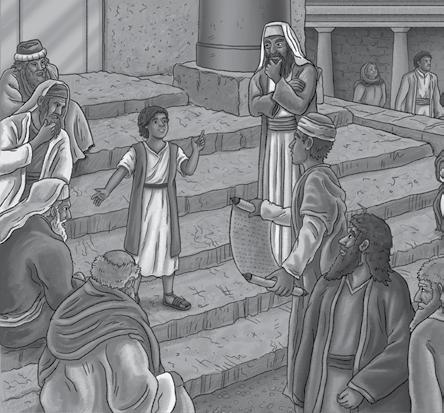
• If you could ask Jesus any question today, what would you ask?

Show the picture in the Children’s Bible while you read Jesus in his Father’s house.
• Where did Jesus and his family go, and why?
• How long did Mary and Joseph look for Jesus?
• Where did they finally find him?
• What was Jesus doing in the temple?
• How did the teachers react to Jesus?
• What did Jesus say when his mother asked why he stayed behind?
• What does the Bible say about how Jesus grew?

• What one thing helps you learn more about God: church, songs, questions, or reading the Bible?
• What question would you like to ask God?
• Why do you think God was pleased with Jesus as he grew?
Dayane was a smart, strong-willed girl. There was only one problem: she didn’t like listening to her mother. Whenever her mother asked her to do something, she would roll her eyes or say, “No, I don’t want to!” Her mother didn’t like punishing her, but she had to teach Dayane that listening was important. “I don’t tell you things because I want to be mean,” her mother would say. “I do it because I love you and want you to be safe.”
One morning, Dayane woke up early and went to the kitchen. Her mother asked her to sit on the wooden chair carefully because it was not very steady. Dayane didn’t listen to her mother. I’m fine!” she said, sitting down.
CRACK! The chair broke, and Dayane fell on the floor.
Her mother helped her up and kindly said, “See? I told you.”
Dayane looked up with tears in her eyes. “I’m sorry, Mommy. I should’ve listened.”
Her mother gave her a big hug. “We’ll work on it together. I’m proud of you for wanting to change.”
From that day on, Dayane started trying harder to listen. It wasn’t always easy, but she and her mother worked together to build trust and good habits. And slowly, things got better.
They learned that love and respect go together—and that listening really is a way to show love.

Play a game of hide and seek. Let one child hide while everyone else closes their eyes. Then, when teacher says, “search”, everyone looks. The one who finds the hidden child is the winner.
Alternatively, if it suits your conditions better, hide an object – maybe a bag or a scarf, or even a packet of sweets, and let the whole class search till someone finds the hidden object.
Talk about:
• How do you think Jesus’ parents felt while they were searching for their boy?
• What shows that they loved him? What shows that he loved them?
The Bible talks about another word when it talks about love. In John 14:21, Jesus says, “Those who accept my commandments and obey them are the ones who love me.” And in verse 23 Jesus says: “Those who love me will obey my teaching. My Father will love them, and my Father and I will come to them and live with them.”
Love and obedience go together. When you get home, ask your parents what they think about that!
Matthew 3:13-17; Mark 1:9-13; Luke 3:21-22 and John 1:31-34

To learn that God loves you and He thinks you are worth it.

Ask the children the following questions:
• What is the difference between the sound of a parent or grandparent’s voice when they are angry with their child and when they are pleased with their child?
• Why do we need to wash ourselves with water regularly?
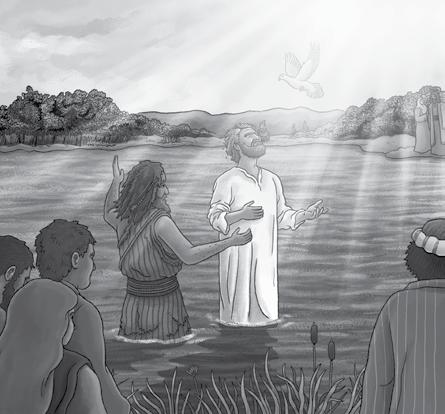
• How does being a child of God makes you feel? Do you think God loves you the way you are?
• How can I be sure that I am a child of God?

Show the picture in the Children’s Bible while you read the story Jesus is baptised.
• Why did John baptise people?
• John did not want to baptise Jesus – he wanted Jesus to baptise him! Why?
• Whose voice was heard after Jesus was baptised? What did the Voice say?
• In this story God showed Himself as the Triune God (Triune means three are also one) – Father, Son, and Holy Spirit. What more can we learn about God the Father, God the Son, and God the Holy Spirit from this story?

• Do you know these words of God the Father/Parent (“This is my Son, whom I love; with him I am well pleased.”) He also says these words about you! You are God’s child; God loves you and is pleased with you! How does this make you feel? How does this change the way you look at yourself?
• This event prepared Jesus for the work he had to do. What would you say, was his job here in the world? Why would he need the Holy Spirit?
We talk today about Jesus being baptised in water. Have you ever been baptised? Many of us are baptised when we are babies, and you might not remember. Ask your parents about it.
Baptism is a sacrament. A sacrament is something we can see to remind us of something wonderful and invisible that God does.
Maybe it is a bit like an iceberg. The biggest part of it is under the water. It is a huge piece of ice, so big we can’t weigh it or measure it, but it is under the water, invisible. Above the water is a little tip of the iceberg. There’s a little bit of an iceberg that one can see. It is the one part you can see and touch and measure.
With baptism, all we see is a moment when you get some water on your head, or you are dipped in water. But like the iceberg, there is a lot more to it. What you can’t see with your eyes is all of God’s love that covers you like a blanket, and that will continue to be with you. We take children or adults, and bless water, and put the water on their heads, or dip them in the water, and while we do that God does and continues to do something wonderful for them.
This is what is wonderful about baptism: in baptism God is telling you who you are.
That’s what God did for Jesus in our story from the Bible today. As Jesus was baptised, one could hear the voice of God from heaven, saying: “You are my own dear Son. I am pleased with you.”
When you are baptised, God says to you: You are my own dear son. You are my own dear daughter. You belong to me you are mine.

We remember Matthew 3:17. This is what God said about Jesus. It is what God is saying about you.
Put these words in order, to say what God says about Jesus and about us:
I is am my son/daughter own with this dear whom pleased
These are very small words, but they mean a lot. What do you feel when you hear them said about you?
Draw a picture of a dove, like the dove that came to Jesus when he came up from the water where John baptised him, and cut it out. With string or wool, hang the dove near your bed, to remind you of what God thinks of you.
Mark 1:14-20; 3:13-19 and Luke 5:1-11

We are called to follow Jesus.

Ask the children the following questions:
• Have you ever been chosen for something? Maybe a team, a group, or a special job?
• What does it feel like to be called or invited by someone important?
• Do you think someone like you could be called to do something special for God? Why or why not?
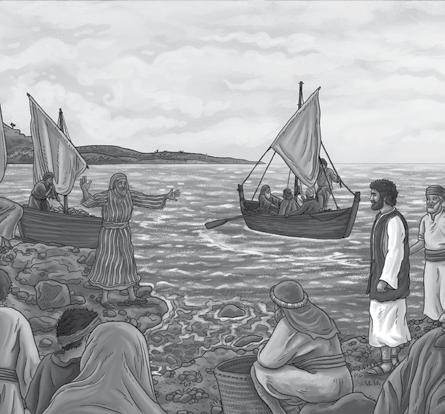
• What might it mean for a child to follow Jesus: at home, at school, and with friends?

Show the picture in the Children’s Bible while you read the story Jesus chooses twelve disciples.
• What jobs were the disciples doing when Jesus called them?
• What did Jesus ask them to do?
• Did He explain everything, or did he just ask them to trust Him?
• Why do you think Jesus chose ordinary people like Peter, James, John and others?
• What does this tell us about who Jesus wants to follow Him?

• What might it look like for you to follow Jesus in your everyday life?
• Are there things (or ideas or attitudes or dreams) you may need to leave behind? Like the fishermen left their nets, to follow Him?
• Who around you might be watching how you follow Jesus?
Florence Nightingale was born into a rich family in England. Everyone expected her to live a quiet and comfortable life like wealthy ladies did in those days.
Florence shocked everyone, because she believed God was calling her to help sick and wounded people, even though it was not something women were encouraged to do at the time. She became a nurse and then went to where there was a war where many soldiers were injured in the fighting. She cared for soldiers during war, even when it was dangerous and dirty. She helped make hospitals cleaner and safer, and saved many lives.
Because of Florence’s hard work, hospitals became cleaner and healthier. Soldiers felt so much better while they were recovering, and the soldiers were very grateful for her care.
When Florence returned home, she was celebrated as a hero and used her fame to improve nursing even more. Florence once wrote in her diary, “God called me in the morning, and I must follow Him.”
Florence’s story reminds us that when Jesus calls, it may not be easy, but it will always bring light and healing to others.

Play a game of “Follow the Leader”.
One person leads a group, and the others follow in a row. The group all must imitate the leader’s actions. When the leader jumps on her left leg, everyone follows, and jump on their left legs. When the leader pats her head, or turns in circles, or whatever, the others do the same.
After a while, let someone else lead.
Talk about: What does the game tell you about what it is like to follow Jesus.
John 2:1-11

To think about Jesus and the power of God he has, to perform miracles to show the power and love of God.

Ask the children the following questions:
• Have you ever been to a wedding or a big party? What was it like?
• What is your favourite part of a celebration — the food, music, games, or something else?
• Have you ever helped at a party or event? What did you do?
• What do you think makes a celebration really special?

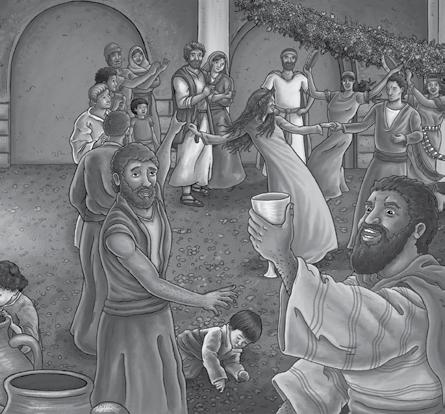
Show the picture in the Children’s Bible while you read the story Jesus at the wedding.
• Who went to the wedding with Jesus?
• What problem came up during the celebration?
• What did Jesus tell the servants to do?
• How did the master of ceremonies react when he received the new wine?
• What does this miracle show about Jesus?

• If Jesus could change something in your life right now, what would you want him to help with?
• The disciples believed in Jesus after this miracle. What helps you believe more in who Jesus is?
• How can you invite Jesus into your everyday life – at school, with friends, or in your family?
Liam and his grandpa were sitting in the garden, watching the clouds roll by.
“Grandpa,” Liam asked, “why did Jesus turn water into wine? That’s a strange miracle, isn’t it?” Grandpa smiled. “It is a bit strange. But you know what? It’s not really surprising if you know who Jesus is.”
Liam turned his head and frowned. “What do you mean?”
“Well,” Grandpa said, “every year, God does a miracle with our grapes. He just does it a little slower.”
“Slower?” Liam asked.
“Yes! First, rain falls from the sky. That water goes into the ground. Then grapevines drink the water, and grapes begin to grow. Big, juicy ones. Later, people pick the grapes and make wine. So, in a way, Jesus is always turning water into wine. He just does it through nature.”
Liam’s eyes got big. “Wow, I never thought about it like that!”
Grandpa laughed. “We don’t notice because it happens all the time. But it’s still a kind of miracle. At the wedding, Jesus did it quickly and right in front of everyone to remind them that he’s always working, even when we don’t see it.”
“So,” Liam said slowly, “the big miracle helps us notice the everyday ones too?”
“Exactly,” Grandpa said. “God sometimes does something amazing that feels unusual, just to help us wake up and see that even normal things are full of wonder.”
Liam looked up at the sky. “So even clouds and grapes and rain are God’s miracles?” Grandpa nodded. “Every single one.”

Let the whole class act out the story of the first miracle of Jesus.
Someone can be Jesus, others are the disciples, Mary the mother of Jesus, the bride and groom, the servants, and the best man.
Having acted it out, ask the children:
Who do you think was the most surprised when they tasted the new wine?
Who was the happiest person at this wedding?
What do you think the bride and groom said to Jesus afterwards?
What does this story teach you about Jesus?
Matthew 8:23-27; Mark 4:35-41 and Luke 8:22-25

Jesus calms the storm. Jesus is in control.

Ask the children the following questions:
• Have you ever been in a storm? What happened? Were you afraid?
• How would it feel to be in a small boat on a stormy sea?
• What are you most afraid of? What kind of problems make you feel as if you’ve lost control?
• Do you think Jesus can really help you when you are in trouble?
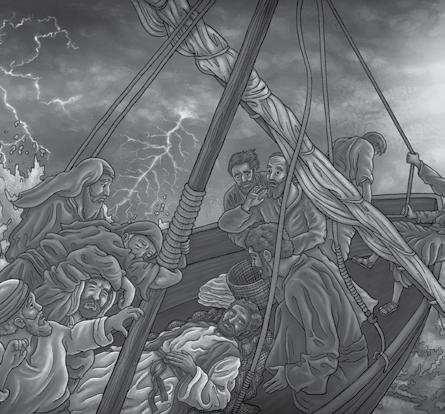
• What are we supposed to do when we are in trouble? What does God want us to do?

Show the picture in the Children’s Bible while you read the story Jesus calms the storm.
• Most of the disciples were fishermen and were probably used to being on boats and in storms. Why do you think they were so scared? What do you think the disciples were most afraid of?
• Why do you think Jesus slept during the storm instead of helping his disciples?
• What did Jesus do and what did He say to His disciples?
• How do you think the disciples’ faces looked like after Jesus spoke and the storm just calmed down?
• Didn’t the disciples know that Jesus was the Son of God? They should have known that He is capable of, shouldn’t they? What did they learn about Jesus after this?

• Jesus is always in control. How does that make you feel?
• “Sometimes, when we face difficulties, Jesus is there with you, but He is waiting for you to cry out to Him.” Do you agree with this statement? What happens when we let Jesus deal with our fears? Why do you think Jesus doesn’t want us to be afraid?
• If Jesus is in control and if He is always with us, does this mean that we will never again have to face any storms?
• Is it wrong to be scared? Why or why not? Can Jesus calm your fears? How do you think he does that?
Scientists say that a dense fog that covers a whole forest, one square kilometre large, to a depth of 30 meters, is composed of less than a glass of water. But that one glass of water is divided into about 60 billion droplets and when they settle over the forest they blot out everything from sight.
Sometimes it is as if we live in this kind of fog. Only a glass full of difficulties and it clouds our vision, and anxiety fogs our thoughts. It would help if we remember that God is bigger and stronger than all of our troubles and with only God’s Word He can calm any storm.
Have you ever watched a sports game when your favourite sports team plays? When you really want them to win, your stomach can be in a knot, you are anxious, and until the end of the game you will sit nervously on the edge of your seat.
But when they win, and you later remember or watch a video of the game, you can sit back and relax and just enjoy the game, because you know how the game ends!
Facing troubles as a child of God, it is supposed to be like watching the replay of the game! You know how the story will end! God will never let you down. He is in control.

Let each child bring a bottle with a lid. It can be a water bottle, or a coffee or jam bottle, for example. It can be plastic or glass. But it must be see-through.
In class, after the story, you are going to create stormy seas in the bottles. First put about 1 to 2 cm rice, or something similar in the bottle. Then add a cup or so of water. What you will need to make boats is a sponge – cut a small kitchen sponge, for example into about 10 pieces. Give each child one little sponge piece.
Close the lid.
Now the children can shake the bottle like a storm. Then the rice will settle, and the sponge will float again, and be safe! Never mind how much you shake the bottle, the “boat” will always float again. (It is best for you to try this at home first, to make sure that it works with the ingredients you have.)
John 11:1-44

To learn that Jesus gives life, not only to be alive and breathing, but also to live a life joyfully and thankfully.

Ask the children the following questions:
• Have you ever lost someone you loved? Even an animal, friend, or family member?
• What does it feel like when someone dies or goes away?
• What are some things that can make people feel sad, tired, or far from life, even when they’re alive?
• Do you know someone who brings joy and hope to others?

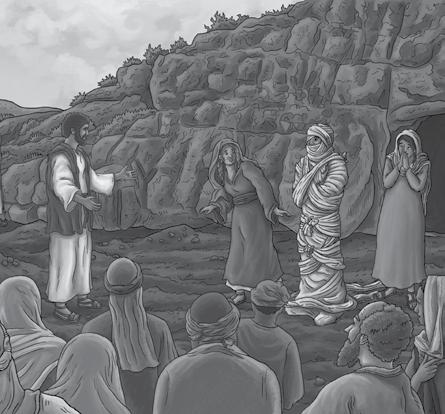
Show the picture in the Children’s Bible while you read the story Jesus and his friends in Bethany.
• How did Jesus feel when He saw His friends crying about Lazarus?
• Why do you think He waited before going to help Lazarus?
• What did Jesus say before calling Lazarus out of the tomb?
• What does this story tell us about who Jesus is, and what He can do?

• If Jesus gives life, what kind of life does He want for you? Just existing, or something deeper?
• How can we help bring life to people around us, through kindness, prayer, or courage?
• When you feel sad or stuck or “in a tomb” inside, what would it mean to hear Jesus calling your name?
Phan Thi Kim Phuc was a nine-year-old girl in Vietnam when her village was bombed with fire during a war. (in her country, one’s surname is written first, and then one’s name – so her name is Kim Phuc). Kim Phuc ran when the attack happened, but she stopped to help another child. Then the fire came. It burned away her clothing, and then her body. A famous photo showed her running, badly burned. People thought she would not survive.
She was in hospital for a very long time; her family was very worried about her. It was very difficult for her, she couldn’t see her school friends, she couldn’t run and play, or go and visit her grandma. She was stuck in hospital in a bed and it felt like she would never live her life again! But But Kim Phuc never gave up. Over many years, she found healing. She later said it was Jesus who gave her a new life, not just in her body but in her heart. She forgave the people who hurt her, and today she helps children who are wounded by war. Kim Phuc said, “I wanted to die, but God had another plan. He gave me life again.”
Her story shows us that even when everything seems destroyed, Jesus can bring life: healing, peace and hope. Today Kim Phuc is an adult woman who loves life, and has helped many children in their difficulties.

Jesus said this to his friends: “I am the resurrection and the life. Those who believe in me will live, even though they die; and all those who live and believe in me will never die. Do you believe this?” John 11:25, 26.
Here are some of the most important words in the verse:
• Resurrection
• Live
• Believe
Divide the class into three groups. Give each group one of the three words. Give them some time to prepare, and then let each group present to the whole class:
Show actions or perform a little play that shows what their word means. (For example, one child lies still on the ground, the rest stand around, crying. Suddenly the child on the ground sits up and smiles, and those stand around, look frightened, then embrace their “dead” friend, smiling and laughing.)
Luke 10:25-37

Jesus teaches us to help one another, and not only our friends and family.

Ask the children the following questions:
• Can you think of a time when someone helped you?
• What would you do if you saw someone trip and fall at school?
• Who do you think is easier to be kind to – friends or strangers? Why?
• What does it mean to be a good friend?

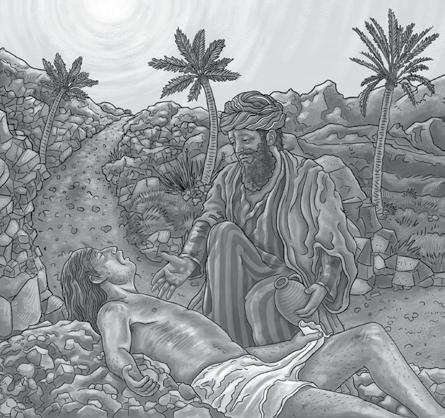
Show the picture in the Children’s Bible while you read the story The Good Samaritan.
• What question did the man ask Jesus?
• What were the two commandments the man quoted from the law?
• Who were the first two people who walked past the injured man?
• Why is it surprising that the Samaritan helped the Jewish man?
• What question did Jesus ask at the end of the story?

• What helps you decide whether to help someone or not?
• How can we learn to see everyone as our neighbour, like Jesus says?
• How can we make loving others part of our daily life?
One day in the United States, a young girl named Akilah, who was just 10 years old, was riding her usual school bus home from school. While on the bus, she looked out the window and saw a boy from another school being bullied by older kids. They were pushing him around and calling him names. No one else seemed to notice—or care.
Even though Akilah didn’t know the boy and he wasn’t from her school or her neighbourhood, she felt she had to help. She shouted to the bus driver to stop the bus and said, “Someone’s in trouble out there!”
The driver pulled over, and Akilah jumped out and ran to the boy. She stood between him and the bullies and said, “Leave him alone!” The bullies were so surprised, they ran away. Akilah stayed with the boy until a teacher came to help. Later, someone asked her, “Why did you help him? You don’t even know him!”
Akilah simply said, “He needed someone to stand up for him. I’d want someone to help me too.”

Make a card for each child in the class with the verse: If you love someone, you will never do them wrong; to love, then, is to obey the whole Law. Romans 13:10
Let them decorate the card.
Let them write on their card the name of a person they love and like. And the name of a person near their home or at school who they don’t really know.
And the name of someone who is very different – maybe much younger, or from another country, or from another faith, or another school.
Invite them to take the card home, and to say something nice or do something good for each one of those three people this week.
Luke 19:1-10

To remember that God notices you.

Ask the children the following questions:
• Have you ever tried to meet a famous person? Or have you ever stood on the side of the road waiting for that famous person to pass by? Why do we do this?
• Imagine yourself being invisible. What would you enjoy about people not being able to see you and what about it will you not enjoy?
• What would you be willing to do if you could meet Jesus personally?

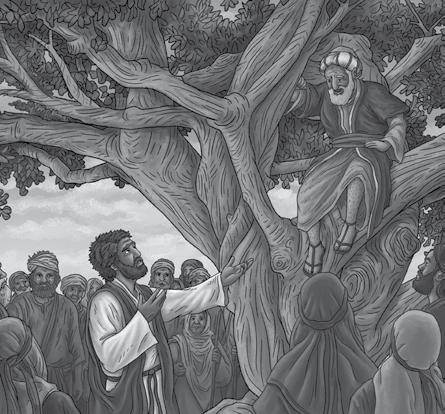
Show the picture in the Children’s Bible while you read the story Zacchaeus in the sycamore tree.
• Why did people not like Zacchaeus?
• If you could make a guess, how do you think did Zaccheus’ feel about himself before he met Jesus? Why do you think he felt good/bad?
• Jesus chose to visit Zacchaeus. What do you think people said about that?
• “It seems as if Jesus had an appointment with Zacchaeus.” Would you say this is true or false?

• Do you sometimes look down on other people as people looked down on Zacchaeus? Or do people look down on you as they looked down on Zacchaeus?
• Why do you think Jesus, amongst the crowd who were there, paid attention to Zacchaeus? How do you know that He sees you? How does it change you when you realise that God always notices you?
• Jesus has an appointment with you! How does that make you feel?
In the bush there lived a family of monkeys. Bobo was one of the youngest monkeys in the family, but he was also one of the naughtiest. He was lazy to go and find his own berries, nuts, fruits and insects.
So, what did he do? He waited in a low branch of the tree, and he would say to monkeys from other families, and squirrels, and tree frogs, and birds in the tree that if they want to come past, they would have to first pay him with some of their nice bits of food.
So it happened that Bobo had more food than he could eat. He hid it away in the tree trunk, so that he could go and fetch just what he felt like whenever he wanted.
An owl saw what he was doing, sitting on a high branch. One day the owl called Bobo: “Hoo hoo, Bobo! I see you, and I want to ask you why you are demanding other animals’ food! Don’t you know they worked hard for their food? Don’t you know they get hungry if you take what belongs to them? I want you to look that little frog in the eyes, and see he is a beautiful frog, and he worked hard to get all those juicy insects. He is smaller than you, and he is slimier than you, and not as cute as you, but he is still a special and important animal ‘cause God made him and loves him.”
Bobo thought about what the owl had said to him. He realised that he was being a naughty monkey. He called the animals of the tree together, and he said to them, “Sorry that I took your food. That was not nice of me. From now on, I will not take your food any more. Instead, half of all the food I find, I will share with you!”
Bobo’s family were so happy that Bobo changed his heart with the owl’s help. At last Bobo could see that all the animals were special, and needed to be treated well, just as the owl had taught him.

Let the children form two lines facing each other about 1 metre apart. One child is appointed to play Zacchaeus, and doesn’t stand in the line. Those in the 2 lines pass a ball (representing Jesus) from one side to the other side, preventing Zacchaeus from catching it. If the child can’t catch the ball after 30 seconds, let them stand on a chair for the rest of the game, like Zacchaeus in the tree. Then let the next child be Zacchaeus and try to catch the ball.
Play a few rounds till your time runs out.
Luke 15:1-7 and John 10:11-18

To remember that Jesus is the Good Shepherd who takes care of us and shows us the way.

Ask the children the following questions:
• Have you ever been lost, even just for a few minutes? What did it feel like?
• Who looks after you when you are hurt or afraid?
• What makes someone a good leader or a good shepherd?

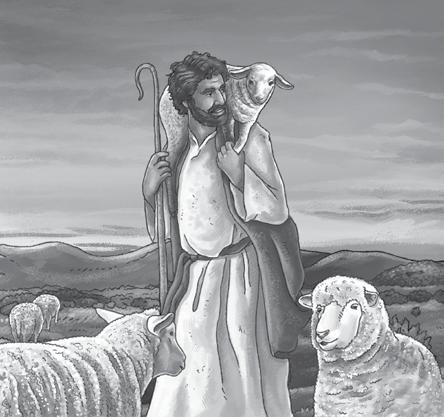
Show the picture in the Children’s Bible while you read the story Jesus is the Good Shepherd.
• Have you seen someone take care of animals with love and patience? What did that look like?
• When we feel small and tired, what helps us feel found again?
• In the story of the lost sheep, what did the shepherd do when he noticed one was missing?
• In John’s Gospel, what did Jesus say makes Him different from a hired worker?
• How far does Jesus say He is willing to go for His sheep?
• What does this tell us about how Jesus feels about you?

• If Jesus is your shepherd, how does that change the way you face fear or loneliness?
• How can you help someone else feel found, safe or cared for, just like a shepherd would?
• What might it mean to follow the voice of Jesus, the Good Shepherd, in your daily life?
Pedro Opeka grew up in South America. As a boy he played football and wanted to become a professional player. That dream didn’t come true, and he learnt to be a bricklayer to build bouses. But he didn’t stay a bricklayer.
You see, God had an idea that Pedro would become a wonderful builder of communities. So, God called him to become a priest in the church. As a priest he worked in different countries. I wonder, if you could go to any country in the world, where would you choose to go and live?
Father Pedro would never have guessed where he would end up! A country that very few people in the world know… an island, called Madagascar.
In Madagascar, many families live by rubbish dumps. Although it is not a nice place to live, it is near where other people throw away the things they don’t want, and sometimes that includes food. So these families, who have no money, look for food and materials to survive in the dumps.
Father Pedro Opeka didn’t just give food or sermons in church. He lived among these people, even though it is not nice to live by a rubbish dump. He was there to listen to them, and help them build homes, schools, and gardens. He was called “a shepherd to the poor”, because he stayed with them when others would walk away.
He said, “No one is too lost for love, Jesus taught us that.” His story reminds us that a Good Shepherd never gives up on the lost, the poor or the forgotten. And that Jesus is the first and greatest Shepherd.

Draw a beautiful field with trees and grass and water where a sheep would love to spend the day.
Then draw a sheep somewhere where you think it would be safe and happy on the picture.
Of course, you will also draw the shepherd nearby. Remember to draw the shepherd’s staff, and his lunch bag!
Luke 10:25-37

To understand that like the son who came back home, we can always come back to God when we have made a mistake, because God is ready to forgive and embrace (hold) us.

Ask the children the following questions:
• What’s the best welcome you’ve ever received?
• When do you feel most loved and accepted?
• Have you ever done something wrong and had to say sorry? How did the other person respond?

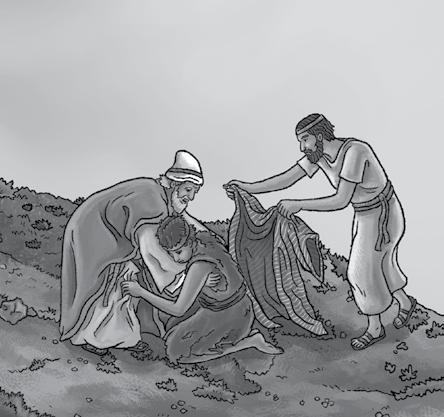
Show the picture in the Children’s Bible while you read the story The son who came back.
• What did the younger son ask his father for?
• How did the younger son spend all his money?
• What made the son decide to go home at last?
• What did the son say to his father when he got home?
• How did the father respond to the son (the father’s words and actions)?
• If God is like the father, what does this story tell us about God?

• How can we be more like the father in the story?
• Who do you know, that might need forgiveness or a second chance?
• If someone hurts you, how can you respond like Jesus would?
Some years ago, my best friend and I had an issue. We would always visit together and phone, and help each other.
One day Pinkie accused me of being rude about another one of our friends. She was very angry with me. She shouted at me, and refused to talk to me again. This was very hard for me because it felt like I was losing my best friend. We stopped talking.
I was often thinking about Pinkie, feeling so sorry I couldn’t explain to her that what she accused me of, was not true.
Some years later Pinkie got very sick. She sent me a message that she wanted to see me. I wasn’t sure what she would say to me. Would you have gone to visit her in hospital? She had hurt me; she had accused me of nasty things. I didn’t want to be shouted at again.
But I decided that Jesus wanted me to go to the hospital. When I got there, Pinkie had tears in her eyes. She said: “I am so sorry for what I said about you.”
What did I do? I went to the shop and bought some ice cream, and the two of us hugged, and had some ice cream together.
Sometimes we make big mistakes, but if we are children of God, we must be willing to reconcile (reconciliation is about fixing a relationship and restoring the friendship. We can be reconciled with a friend or a sibling or parent, but also with God).
Here is a beautiful verse about reconciliation between us and God, in Colossians 1:20: Through the Son, then, God decided to bring the whole universe back to himself. God made peace through his Son’s blood on the cross and so brought back to himself all things, both on earth and in heaven.

Talk about each of these words and what they mean, then (without checking the Bible) fit them in the verses below: sin forgive forgiving
Also fit these words in where they belong: red white east love
1 John 1:9:
But if we confess our ______ to God, he will keep his promise and do what is right: he will _______ and purify us from all our wrongdoing.
Isaiah 1:18:
The Lord says, “Now, let’s settle the matter. You are stained ______ with______, but I will wash you as clean as snow. Although your stains are deep ______, you will be as _______ as wool.
Psalm 103:12:
As far as the ______ is from the west, so far does he remove our ______ from us.
Psalm 86: 51:
You are good to us and _______, full of constant _____ for all who pray to you.
Daniel 9:9:
You are (God is) merciful and ________, although we have rebelled against you.
What do these verses together, say about God?
Luke 17:11-19 and 18:35-43

We learn to always be thankful to God, even for those things we forget that God has blessed us with. We also learn to always say thank you for other people’s kindness and help, and why it is important to say thank you.

Ask the children the following questions:
• What has another person done for you that you were very thankful for? Why were you so grateful?
• How does one usually show thankfulness?
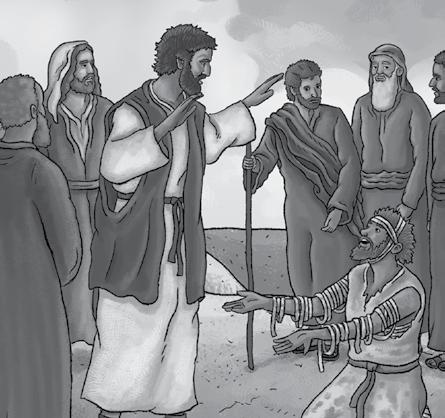
• Has someone ever shown you that he/she is grateful for something you did?

Show the picture in the Children’s Bible while you read the story Jesus helps people who need him.
• Imagine you are one of the nine people who were healed who didn’t say thank you. What do you tell your friends and family at home?
• Imagine you are the one who was healed and who went back to thank Jesus. What would you tell your friends and family at home? What is the difference between your story and the other nine stories?
• Why would the one be so grateful, and the other nine not? Could we make the same mistake today—not realising how good God is to us?

• Make a list of things that you are thankful to God for.
• How can we live with more gratitude?
• We cannot thank God with only our words; we should also show our gratitude with our actions. What would you like to do this week? Tell God about it and ask God for guidance and strength.
One thing I am very grateful to God for is that God gave me the ability to taste. Can you imagine not being able to taste a sweet orange, or hot bread, or soft chicken on the bone…. or (what is your favourite)? I remember when I am sick, sometimes, and my nose is blocked, it changes how I taste food. Have you ever had that? Even the nicest cake tastes like nothing! And I wish I could taste again, and then I am thankful that God created my senses of smell and taste to make life to be so much more fun!
Our parents teach us to say thank you, but we forget too often. When it comes to thanking God, there are many things to say thank you for. And there are many reasons why it is good to always, every day, thank God.
Psalm 92:1 says “How good it is to give thanks to you, O LORD, to sing in your honour, O Most High God”.
What do we give thanks for? This list will give you some ideas, and you will surely have more:
• For spiritual blessings like God’s love and forgiveness
• For everyday blessings you do not normally notice like sunshine and fruit that grow on trees
• For people in our lives like a parent or grandparent
• For people we don’t not even know, who bless us
• For answered prayers
• For surprises in our lives
• For the everyday events we take for granted
Why should we always thank God?
• It helps us notice God’s presence and work in our lives, not to take God for granted
• It helps us realise that we do not create our own “good luck”
• It highlights God’s goodness
• It teaches us to trust God for the future
• It teaches us to be generous to others in turn
• It helps us to focus on the giver and not just the gift
• It helps you not to take people for granted
• Gratitude leads to a joyful life
• It helps you to be less arrogant
How do I learn to be thankful for everything, all the time?
• Take time to notice what is happening in your life; do not wake up and rush all day!
• Make time every day to just pray prayers of thanks, even start a thanksgiving diary in which you write your thanksgiving
• If you have a smartphone in the home, get permission to take a picture on your phone of the things around you that you are grateful for
• Tell someone what you are grateful for
• Show God in your worship, your attitude and your own generosity, the thankfulness of your heart.

Draw pictures of some of the things you are thankful for. Then write a prayer on the same paper saying thank you to God for the things you can think of, that God has done for you.
Did you say thank you the last time you got a present? Sometimes we get so excited about a sweet or a toy or a new shirt, that we forget about the one who gave it to us! Write down names of people you should go to, to say thank you for something.
Matthew 14:13-21; Mark 6:30-44 and John 6:1-14

In Jesus’ hands, everything changes.

Ask the children the following questions:
• Have you ever had only a little of something, like food, time, energy, and still shared it with someone else?
• What does it feel like when your small help makes a big difference?
• In your daily life, what are things that sometimes feel “not enough”?
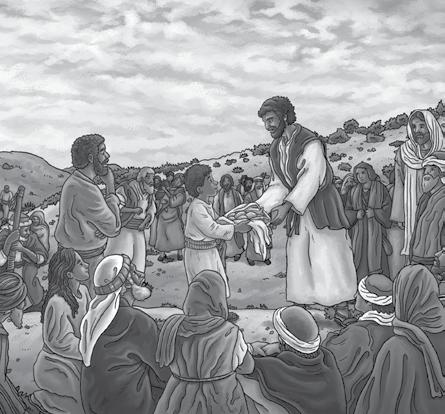
• Have you ever seen a small act of kindness or sharing turn into something big?
• What would it mean to put your lunch, your time or your help “in Jesus’ hands”?

Show the picture in the Children’s Bible while you read the story Five loaves and two fish.
• What did the disciples think when they saw the hungry crowd?
• Who brought the five loaves and two fish? Was it a lot or a little?
• What did Jesus do with the small meal once it was placed in His hands?
• What do we learn about Jesus when He sees a crowd of hungry people?

• What small thing do you have that you could offer to God? Something like a talent, a helping hand or a kind word to someone else?
• What might happen if you trust Jesus with your “not enough” – the little bit that you have?
• Who around you might need to know that even small things matter when they are given to God?
Jahkil Jackson was just a young boy who loved his dog, video games and basketball. Jahkil Jackson started his work at the age of eight after when he saw how many families in his city in the USA did not have food, and not even a house to stay in.
He started thinking about people in this kind of situation when he was five years old already. He would ask his mother and father question about people who are struggling, and he was unhappy that some people have much more than they needed, and other people don’t have enough.
After thinking for a while, he found a small way through which he could make a difference.
He started making blessing bags. He filled a blessing bag with wet wipes, socks, deodorant, hand sanitizer, a breakfast bar, toothbrush, and toothpaste. Then he handed them to people who are struggling very much. That is a very good thing for anybody to, do especially a young boy.
During the Covid-19 pandemic he started virtual online get-togethers so people could join in on the internet wherever they were to pack blessing bags, too, These “Blessing Bag Parties” became big, where people across the nation and the world could join his mission to extend kindness to those in great need.
Now his Blessing Bag project has spread to many places across the world, and many people are doing the same as Jahkil. In this way, what one one young boy started has blessed many thousands of people around the world. One could say his first blessing bag was his 5 loaves and 2 fish that he presented to Jesus!

Ask the class each to draw something ordinary on their paper that one can use every day, something unimportant, cheap—maybe a spoon, a pencil, or a toothbrush, shoelaces, etc.
Encourage them to draw something different from what others are drawing. Allow about a minute, and then have kids trade papers with people around them.
Say: You have a drawing of something ordinary. Now think of three or more ways you can use that item in a way that’s different from what it’s normally used for. For example, a spoon could make holes in the ground to plant seeds. A toothbrush can scratch your back, or be used as a paintbrush...
Allow about five minutes or so, for them to think. There are no wrong answers. Once everyone has finished, have children share their ideas. Talk about:
We talked about ordinary everyday items that we can use in many ways. We who are ordinary people, can also be used by Jesus in extraordinary ways!
What are some reasons Jesus might choose to work with ordinary people and things when he does miracles?
What is one ordinary thing about you that God could use in big ways?
Mark 10:13-16 and Matthew 18:2-4

To appreciate that Jesus is not only interested in adults, or important people. Children are important to him.

Ask the children the following questions:
• Do you like helping take care of little children or babies? Why or why not?
• Has anyone ever told you that you were “too little” to do something? How did you feel?
• What do you think makes someone “important”?
• What do you think makes God happy about children?

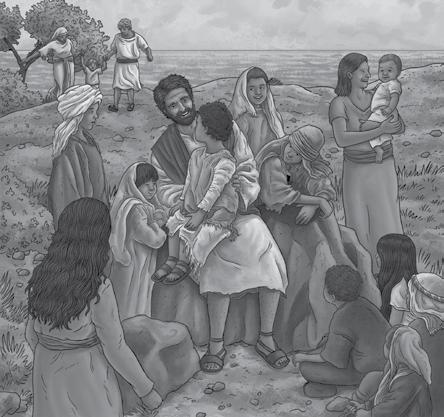
Show the picture in the Children’s Bible while you read the story Jesus and the children.
• How did Jesus treat children?
• What were the disciples arguing about?
• Why were the disciples trying to stop the parents and children?
• How did Jesus feel when he saw what the disciples were doing?
• Who does Jesus say is important in God’s eyes?
• What can we learn about Jesus from how he treated the children?

• How can you show God that you trust him, like children trust their parents?
• Who can you help feel special this week?
• What do you want to say to Jesus after hearing this story?
I spoke to a friend, Mr Norman Malukazi the other day about children. He said an amazing thing to me, He said: “A church without children isn’t a church.”
Can you believe that?
You don’t need to be big or educated to love Jesus. There was a little girl who had a disability. She couldn’t walk or talk. Her mother took her to church, and people wondered: why doesn’t she just stay at home? What is she doing here?
When they looked again, the little girl, carried by her mother, was touching the cross on the wall, the cross that reminds us that Jesus died for us and loves us. And as she touched the cross, she kissed it, with love in her eyes.
And those who saw it had tears in their eyes, because a 5-year-old girl with a disability was teaching them about loving Jesus.
Yes, a church isn’t a church without children. Children can teach adults many things, and we need them, we want them, we love for them to be in the church. And so does Jesus.

You will need an apple or another fruit.
Let the children stand in a circle and pass an apple around, while you sing a children’s Bible song. When the song ends, the child holding the apple must step into the middle of the circle. All the other children say together, “(Name), always remember: Jesus loves you!”
When you have played a few rounds of the game, children can draw the outline of their hand on a piece of paper. Then they can write one word in each of their five fingers: Always Remember Jesus Loves Me
Matthew 26:6-13 and Mark 14:3-9

Jesus wants us to honour Him in any way we are able to.

Ask the children the following questions:
• Have you ever spent a lot of money on something, and you thought it was money well spent, but then other people thought you wasted money? Why did they think that?
• What is the most expensive gift that you have ever given someone?
• How can we worship Jesus today? What is your favourite way of worshiping God?
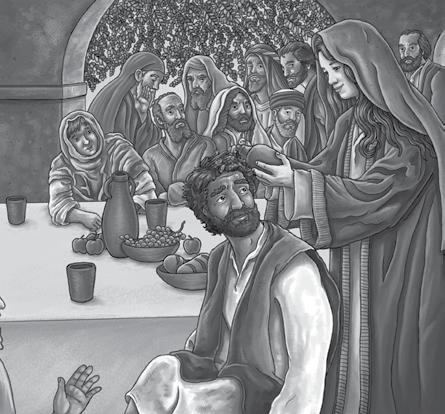
• What would you give Jesus as a gift if He came to your house today?

Show the picture in the Children’s Bible while you read the story A woman anoints Jesus.
• Why did some view the woman’s use of the expensive perfume as a waste?
• Why was anointing Jesus not a waste in the woman’s eyes? Why was it not a waste in Jesus’ eyes?
• How did the heart of the woman towards Jesus differ from the heart of Judas towards Jesus?
• How has what Jesus said about her (in Mark 14:9) come true?

• The woman worshipped Jesus without regard to others’ opinions. Can you think of ways in which you can worship Jesus? Can you worship Him in a way that might not make sense by earthly standards, but makes perfect sense by God’s standards?
• What did Jesus sacrifice for you? How will this truth impact what you are willing to sacrifice for Him?
One day an old man sat on a bus holding a bunch of fresh flowers. A young woman sat across the aisle. She looked at the old man and smiled when she saw the flowers in his lap. They were such beautiful flowers that she kept on admiring them.
When the bus stopped somewhere, the old man stood up to get off the bus. With a smile he put the bunch of flowers in the woman’s arms and said: “The flowers are actually for my wife, but I saw you liked them, and I think my wife would love for you to have them. I’ll just tell her I gave them to you.”
Grateful, the girl took the lovely flowers. When the bus started to move again, she saw the old man slowly walking through the gates of the cemetery. The young woman realised the old man was planning to put the flowers on his wife’s grave. He came all the way to the cemetery to honour his wife, and to put flowers on her grave to remember his love for her.
What a beautiful thing it was to give them to the young woman, what a sacrifice it was for him to do that. But out of the kindness of his heart he gave the flowers to a stranger.
I am sure the young woman treasured the flowers, and told many people about what the old man did for her that day.

Today is a day to honour Jesus and to worship Him. Divide the class into four groups, and have each group spend some time to prepare for a worship time for Jesus.
Group 1: find three or four Bible verses that praise and thank Jesus.
Group 2: think of a few worship songs you want to sing together. You could even make up and practice a worship dance.
Group 3: decorate the room with flowers or cloth, or whatever you have available.
Group 4: write a prayer to share with the class in the worship time, a prayer of thanks and praise to Jesus.
When all the groups are done, let the class come together and bring all the different elements you have prepared, to worship Jesus together.
Matthew 21:1-17 and Luke 19:28-46

To appreciate that Jesus came in humility to give His life for us.

Ask the children the following questions:
• What kind of people usually ride in parades or sit on big thrones?
• Have you ever met someone who was important, but acted kindly and gently?
• What does it mean to be humble?
• When you do something good, do you like others to notice?
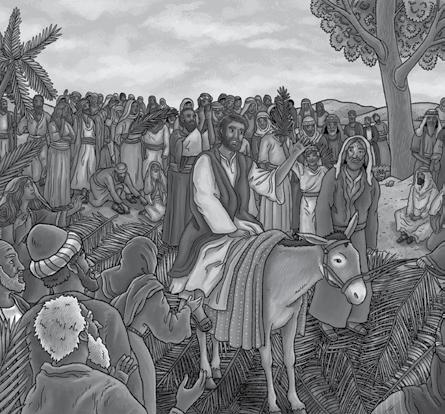
• Have you ever helped someone quietly, without wanting to be seen? How did that feel?
• What kind of leaders do people usually admire? What kind of leader do you think Jesus is?

Show the picture in the Children’s Bible while you read the story Jesus enters Jerusalem.
• What did Jesus ride into Jerusalem? Was it a war horse or a donkey? Why is that important?
• How did the people welcome Him? What did they shout?
• What did Jesus do in the temple when He saw people using it to make money?
• What does this story show us about the kind of King Jesus is?

• If Jesus is a humble King, how can we follow Him in being gentle, kind and fair?
• What does it mean that Jesus gave His life for us?
• How can we live our lives to show love the way Jesus did?
Here is the story of someone who has become very well known all over the world. It is the story of Mohandas Karamchand Gandhi, who later became known as Mahatma Gandhi. He was born in India, a country ruled by Great Britain. The people of India felt that these people were sometimes very unfair to the Indian people, and they wanted to become free to make their own decisions and rule their own country again.
Gandhi helped India fight for freedom. When I say “fight” you might imagine swords and knives and guns and cannons. But Mr Ghandi had none of those! He did not fight with weapons or power, but with peace and humility. He believed that fighting with weapons and violence was not the right way to solve problems. He thought about how to make things better without hurting anyone.
He wore simple clothes, ate simple food, he was very humble, and treated others with respect, even when they disagreed with him. He said, “The best way to find yourself is to lose yourself in the service of others.”
Because of his peaceful protests and his message of love and unity, Gandhi became a very famous and respected leader. He inspired people all over the world to fight for their rights without using violence.
Finally, India gained its freedom from British rule, and Gandhi became a hero for his country and for people fighting for justice everywhere. He showed that even one person, using love and nonviolence, can make a big difference in the world.
Mr Ghandi’s life shows that true strength can come through gentleness and giving. He was not a Christian who knew Jesus, but somehow, he managed to follow the way of Jesus, and we respect him for that. His story reminds us that Jesus showed us a new kind of leader, not proud and loud, but humble and brave, giving His life out of love.
I wonder how life would be if we all learnt to be humble in the way we live, even in an argument. I wonder how life would be if we learnt to respect everyone, even if we disagree with them. I wonder how life would be if we were ready to help and serve anyone who needs help, whoever they are.

Act out the story of Jesus, the disciples and the crowd, and the teachers of the law who were irritated by Jesus and looking for a way to get rid of him.
You will need a donkey – if you live somewhere where you can borrow a real donkey, do that – otherwise cover a stronger boy in a blanket while he kneels on all fours, clothes to spread on the road, and branches to wave that you can get from trees (palm trees if you have).
Ask the child who played Jesus, the donkey, the followers, and the critics how they felt playing their roles.
Mark 14:12-26; Luke 22:7-39 and John 13:1-17

To connect the Last Supper of Jesus with Holy Communion, and to understand he was showing the disciples, and us, his nature to serve and teaching us to do the same.

Ask the children the following questions:
• Why do we sometimes have special meals with our families?
• Have you ever helped serve food at home or at a party?
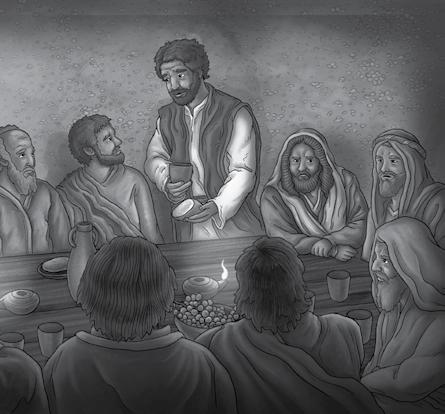
• Have you ever had to say goodbye to someone? What helped you remember them?
• What do you think makes a good leader?

Show the picture in the Children’s Bible while you read the story The Last Supper
• What special meal was Jesus having with his disciples?
• Why did Jesus wash his disciples’ feet?
• What lesson did Jesus teach by washing their feet?
• What did Jesus say about being a leader in his kingdom?
• Who did Jesus say would help the disciples after he went away?
• Where did Jesus and the disciples go after the meal?

• What’s one thing you could do to remind others about Jesus’ love?
• What helps you remember that Jesus loves you?
• How can you let the Holy Spirit guide you every day?
A few days ago, I hurt my knee badly at the beach and spent some time in the hospital. Hours later when I was being released, I was leaving the hospital barefoot, and with sea sand on my feet. A nurse asked if she could clean the sand off my feet.
I gratefully said yes and she started to wash my feet. She did not pour water over them and leave them to dry. No, she took a lot of care to do this for me. She carefully wiped the sticky sand and salt off each foot and from between the toes, gently holding my feet, and protecting my injured knee.
Earlier I had wept – sobbed – from the pain of the doctor putting my kneecap back in place. But now tears were in my eyes for another reason as she washed my feet. It almost felt that it was Jesus washing my feet. I don’t know if she was a believer in Jesus, but what she was doing was very special to me, reminding me of what Jesus did for his disciples.

If you can sit around a table with your class, do so. Bring some bread or sandwiches to class that you can share with them all. When they are all seated, say grace, something like:
“Lord Jesus, thank you that we can be together in your name. We remember you sat and ate with your disciples one day when you told them the bread they ate should always remind them of you. So, we thank you for this bread and we also remember you, and how much you love us.”
Hand out the bread or sandwiches, and eat together.
You may also have a bowl of warm water and a few towels. Sit on the floor, and let the children come, one by one, for you to wash their feet while the class sings Bible songs. You can end the time with a prayer like:
“Jesus, this morning we remember you and the special time you had with your disciples. We are thankful that you are here with us, too, teaching us about your life and the love in your heart. Amen.”
Matthew 26:31-35; 69-75 and Luke 22

To understand that God can use people who have made mistakes in their lives.

Ask the children the following questions:
• Have you ever made the same mistake a few times in a row? Have you ever been so sure that you could do something, just to get it wrong yet again? How did it make you feel?
• Do you think God allows his disciples to make mistakes? Or is perfection the only acceptable standard for followers of Jesus?

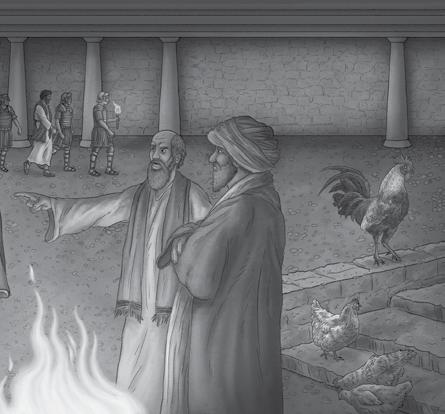
Show the picture in the Children’s Bible while you read the story Peter disowns Jesus.
• At the Last Supper, Jesus predicted Peter’s mistake. He said: “You will deny me three times before the rooster crows!” What was Peter and the other disciples’ reaction? How did Peter feel after Jesus said this, do you think?
• Why do you think Peter said he did not know Jesus?
• Peter made some mistakes as a disciple. Think about him “walking on water” (but he sank) or saying the wrong things... Was Peter a bad disciple? Did he really love Jesus? Why do you say that?
• What was Jesus’ reaction after Peter’s denial (saying he didn’t know Jesus)? How did Jesus use Peter after His resurrection? Did Peter learn from his mistakes?

• “Our mistakes do not disqualify us as disciples.” Do you agree? Why (not)?
• What should we do when we realise that we have sinned?
• How do we know that God can use broken people?
Joe’s mother loved to sew beautiful things, and to do embroidery on cloths. One day, when Joe was little, he sat by her feet while she was working. He looked up from the floor and ask her what she was doing. She told him that she was embroidering. All Joe could see was the back of the cloth. There were threads all over the place, and it looked very untidy. It just looked like his mother was making a big mess with a needle and thread! “Mom, I don’t think you are doing it right… it looks… funny!”
His mother just smiled and said, “Joe, you go play for a while and when I’m finished, I will show you the other side of my embroidery.”
After a while his mother called him. Her embroidery was finished. She then showed Joe the front side of the embroidery. He was so surprised and excited to see a beautiful picture! He could not believe it! His mother said, “Yes my dear boy, from underneath it looked messy, but you did not realise that the mess on the bottom was becoming a beautiful picture on the top.”
God works like that with all of us. Sometimes, to us, it feels a little bit messy—and we sometimes make big mistakes, but God is still working and God can see the whole picture and create something beautiful even out of our mistakes!

Make a very narrow pathway by drawing two very close lines on the floor with chalk or something else that can be wiped off.
Ask the children to stand in a circle around the lines, to look that no one makes a mistake. Get the children to take turns to walk in the narrow path, without stepping on the line or outside the lines.
If anybody steps on the line, or steps out, say: “No, you’re out! You made a mistake!”
But then have the rest of the children say: “Never mind! You can do it. Just step back in, and carry on.”
Talk about: If you were one of the children who made a mistake, and you were allowed to carry on without a penalty, how did that feel?
Sometimes we make mistakes, and we need to learn that we did a wrong thing (like the cock crowing reminded Peter that he did something wrong). But we can be sorry and get back on track.
Everyone makes mistakes. But the important thing is to learn from them.
Matthew 26-27; Mark 14-15; Luke 23:44-49 and John 18-19

To understand that Jesus suffered and died and that He understands pain and suffering.

Ask the children the following questions:
• Who do you talk to when you feel pain inside or outside?
• Do you think anyone truly understands how you feel when you’re hurting?

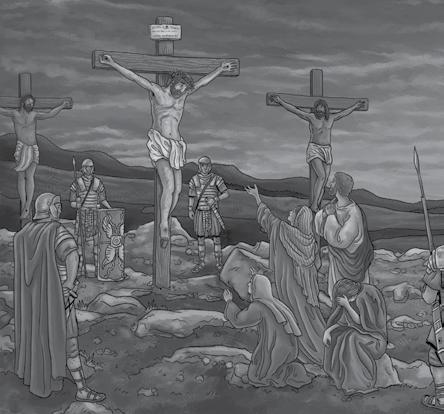
Show the picture in the Children’s Bible while you read the story Jesus is crucified.
• Have you ever seen someone suffer quietly, without complaining?
• What does it mean to walk with someone when they’re hurting?
• What did people do to Jesus, even though He had done nothing wrong?
• How did Jesus respond? Did He fight back or get angry?
• What did He say to the people and to God from the cross?
• What does this tell us about Jesus? Especially about His heart when people suffer?

• What does it mean to know that Jesus felt pain and sadness, just like we sometimes do?
• When you are hurting, how might it help to remember that Jesus understands?
• If you could have been there when this happened to Jesus, what would you have said to him?
• Was this story the end of the story of Jesus? Why or why not?
Richard Wurmbrand was a pastor in Romania during a time when people were not allowed to talk about Jesus freely. He was arrested and sent to prison for many years, often locked in darkness, and beaten. But he kept praying, singing quietly, and even forgiving those who hurt him. He later said, “Jesus was with me in the cell. I was never alone.”
After being set free, he helped others who were in pain and started a group called Voice of the Martyrs to support persecuted Christians (people who are punished for loving Jesus— this happens in some places around the world). Richard’s story reminds us that Jesus understands our pain and He stays close, even in dark.

Talk about: Why do we always have a cross on a Bible, in a church, even on jewellery that we wear?
Ask children to draw a cross, nails, and a crown of thorns.
Anna Bartlett Warner who lived from 1824 to 1915 wrote a hymn that we still love to sing. Anna Barlett Warner wrote Jesus Loves Me to be included in a story her sister wrote. Her sister asked her to write a song for the book, in a place where a character in her story sang a song to comfort a dying child. This is what Anna did. The book was published in 1860.
Read the song, or sing it. Talk about what it says about Jesus, and how the hymn makes you feel.
1 Jesus loves me, this I know, for the Bible tells me so. Little ones to him belong; they are weak, but he is strong.
Yes, Jesus loves me! Yes, Jesus loves me! Yes, Jesus loves me! The Bible tells me so.
2 Jesus loves me he who died heaven’s gate to open wide. He will wash away my sin, let his little child come in.
Yes, Jesus loves me! Yes, Jesus loves me! Yes, Jesus loves me! The Bible tells me so.
3 Jesus loves me, this I know, as he loved so long ago, taking children on his knee, saying, “Let them come to me.”
Yes, Jesus loves me! Yes, Jesus loves me! Yes, Jesus loves me! The Bible tells me so.

To learn that Jesus died but is alive again, and he lives forever. Nothing can stop him, nothing can kill him.

Ask the children the following questions:
• Have you ever woken up really early for something exciting?
• What’s the best surprise you’ve ever had?
• Have you ever shared exciting news with others?

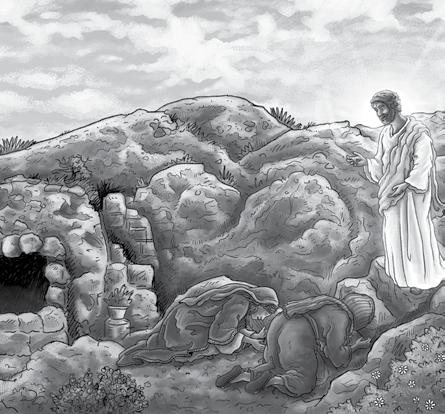
Show the picture in the Children’s Bible while you read the story Jesus rises from the grave.
• What did Jesus’ friends do with his body after he died?
• Who went to visit the tomb (grave) first?
• What did Mary find when she got there?
• How did Peter and John react when they saw the empty tomb?
• Who did Mary think Jesus was at first?
• What made her realise it was Jesus?
• What message did Jesus give Mary to tell the disciples?

• What does this story teach us about God’s power and love?
• How does knowing that Jesus is alive, help you?
• How can we share good news with others, like Mary did when she went to tell the other friends?
• What is something you can do today to bring joy to somebody, like Jesus did?
A little four-year-old girl couldn’t wait for Easter Sunday to arrive. She was all dressed up in her new Easter dress and shiny shoes.
But her father wasn’t sure if she really understood what Easter was all about.
“Kara, do you know what Easter means?” he asked.
“Yes, I do!” she said with a big smile.
“Tell me what you think it means,” her dad said.
With a huge grin and her arms thrown up in the air, she shouted, “Surprise!”
There’s probably no better word for Easter than “Surprise!” that was exactly how Jesus’ disciples and close friends, like the women, must have felt on that first Easter Sunday: SURPRISE!
It was the biggest surprise ever, because the one they knew was dead was alive again! Then Jesus started coming to them wherever they were, and all they could think was: What a surprise!
The resurrection of Jesus (his coming alive again after he was dead for days) is the greatest surprise of all time, and it turned the whole world around with joy and hope. If God could make Jesus live again, God really can do anything.

Talk about: what was a butterfly before it is a butterfly? It is a caterpillar, a strange ugly worm, and all it does is eat! When the caterpillar is fully grown, it grows a cocoon, around it. Almost like it is dead, and in a coffin or a grave! A week or so later the cocoon breaks open and surprise! What comes out? A brand-new, beautiful butterfly with the softest, most colourful wings, that flies and makes the world a very beautiful place.
One can say that’s a picture of what happened to Jesus. He died and was in a grave for three days, then he came out, strong, beautiful and alive for ever.
Draw the most beautiful butterfly, and remember Jesus!
Luke 24:50-53 and Acts 1:1-11

We have a job to do and the Holy Spirit to help us.

Ask the children the following questions:
• Have you ever taken on a project that you asked yourself: “How am I ever going to get this done?” Did you get it done or not? What helped you to get it done?
• How does it feel when your parent(s)/your guardian, or another important adult has to go away for a few days? Or perhaps you had to go away for a few days. Did you miss them? How does it feel and what do you do when you want to ask them something, or need something from them?
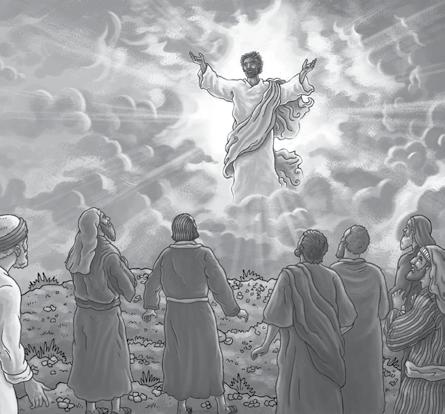
• Jesus gave His disciples a great commandment. What was the commandment? Do you think the commandment is also meant for us?
• Is Jesus really Immanuel—God with us? Didn’t He leave us?

Show the picture in the Children’s Bible while you read the story Jesus ascends to heaven.
• Why did the disciples have to wait in Jerusalem?
• What command did Jesus give his disciples just before his ascension (leaving the world and returning to heaven)?
• After Jesus was taken up into heaven, what message did the angels give the disciples?
• Pretend you are the disciples going down the mountain to Jerusalem, without Jesus. What do you think they said to each other? How do you think the disciples felt?
• “When Jesus, God the Son, was here on earth, He could only be in one place at a time. But after His ascension, through His Holy Spirit, He can be with all of us all the time”. How does this change everything?

• How does it make us think and feel differently when we know that Jesus is with us? He rules from heaven, but He is also here!
• What comfort does it bring us to know that Jesus’ Spirit is with us, always and everywhere, and gives us strength?
• How does the Holy Spirit help us with the great commandment?
There is a statue of Jesus in a church in Soweto, South Africa. Since many public gatherings were banned during the apartheid era when the police were very strict about where people could go or not, people gathered in churches, which was allowed. This church was one of them. One day the police broke up a gathering in the church and during the fight, the statue of Jesus fell and its hands were broken off.
The congregation decided not to repair it. They left it without hands. Why? Because they realised that the broken statue has a very important message to the people of the church: Jesus is not on earth any more. We are the ones who are doing his work now! They put up a sign that reminded everyone that Jesus’ followers are ‘Christ’s hands’ in this world.
The story reminds us of a very holy woman who lived a long time ago, Saint Teresa of Avilla in Spain, who said: ““Christ has no body on earth but yours, no hands but yours. Your eyes are the eyes... Your eyes are the eyes through which the love of Christ looks at the pain of the world. Your feet are the feet with which Christ wants to do good. Your hands are the hands with which He now wants to bless the whole world.”

Draw a picture of yourself, but be sure to make the eyes, hands and feet a different colour, to remind you that your eyes and hands and feet are not only yours, but they are also Jesus’.
Talk about: What can your eyes and hands and feet do this week, to show other people that Jesus cares for them?
What other parts of your body can you use to bless the world and the people around you?

To understand that Jesus is still with us, because his Holy Spirit is inside us.

Ask the children the following questions:
• Have you ever felt close to someone, even when they were far away?
• What do you think it means when someone says, “God is with us”?
• If Jesus is not here in a body, how can He still be near us?
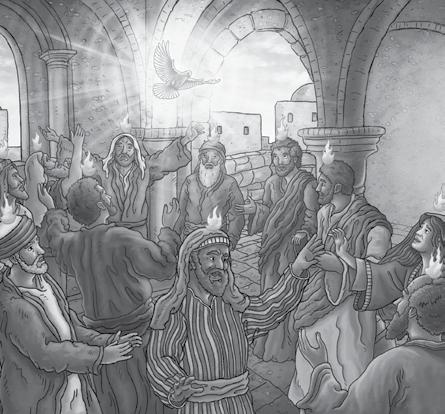
• Have you ever felt a sense of peace, joy or courage, even when things were hard?
• What do you think it means to have Jesus “inside your heart”?
• Can you think of a time when someone said or did something loving or kind that felt like a gift from God?

Show the picture in the Children’s Bible while you read the story The Holy Spirit comes.
• What were the disciples doing when the Holy Spirit came? Were they ready or surprised?
• What did the Holy Spirit do? How did people feel, speak or act?
• Why did Jesus send the Holy Spirit after He went back to heaven?
• What does this story tell us about how Jesus stays close to His followers?

• How might the Holy Spirit be working in you? Maybe when you pray, help someone or feel brave?
• If Jesus is inside you, how can you show His love to others?
• Who in your life might need to know that they are never alone?
Gladys Aylward loved stories about China and dreamed of going there to tell people about Jesus. Gladys lived in England, and her dream was to go to China to teach people about Jesus. She did not have any money, and her family were not able to help her to fulfil her dream. So, she worked hard, doing little jobs because she was not educated. Eventually she saved enough to buy a ticket to go to China on a ship. The journey was long and dangerous, but she was happy to arrive in China!
She was so disappointed when they told her she was not educated enough to become a missionary (a person who is sent to teach people in another country, about Jesus) but she knew the Holy Spirit was with her, and she could do God’s work with the Spirit’s help.
Gladys believed the Holy Spirit was guiding her. In China, she worked in a hostel, shared the Bible with everyone she could and took care of orphaned children (children with no parents). When war came, she led her children on a dangerous trek through the mountains to safety.
She once said, “The Spirit gave me strength I didn’t know I had.” Her story reminds us that when the Holy Spirit lives inside us, Jesus gives us courage, love and the power to keep going — even when it’s hard.

Get the children to create as much wind as they can, with fans, waving papers, anything that you can think of, that will create wind. Let the children do it all together. When you stop, ask them if they could see the wind. Could they feel it? Did the wind blow anything away? Did it make a noise?
We can’t see the wind, but we can see leaves blowing, feel water spraying, hear trees rustling.
In the same way, we cannot see the Spirit, but we see the how the Spirit works. Here are some words to work out to help us know what the Holy Spirit does for us. These are all other names for the Holy Spirit of God:
Someone who gives us an idea to do something good, that we didn’t really think of, but it came into our heads:
__ __ __ p e r
Someone who will always be close to us, encourage us, and be kind to us: __r __ e__ d
Someone who helps us to learn new things, like how to be loving, patient, king, good, etc. (see the rest of the list in Galatians 5:22)
T __ a c __ e r
Somebody who comes close to us, and holds us when we feel sad: C __ m f __ r __er
Someone who shows us the way: __ u i __ e
(helper, friend, teacher, comforter, guide)

To understand that God created the church through the power of the Holy Spirit and that we can all be part of God’s family, the church.

Ask the children the following questions:
• What’s something you’ve seen or heard that made you say, “Wow!”?
• Have you ever been part of a team or a group where everyone worked together?
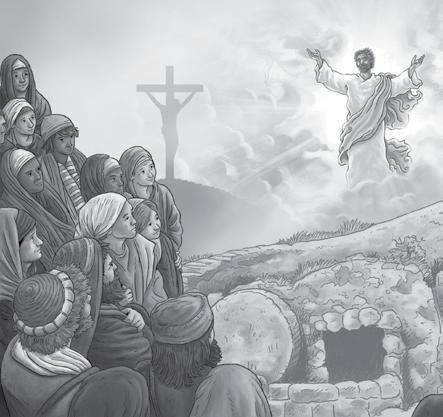
• Do you know what a church is? What do you like about going to church?
• Why do you think people like to tell others good news?
• What do you think it means to be “filled with the Holy Spirit”?
• Can children do important things for God?

Show the picture in the Children’s Bible while you read the story of The beginning of the church.
• What special event happened in this story?
• What did Peter tell the people about Jesus?
• What happened after Jesus went back to heaven?
• What was different about the disciples once the Holy Spirit came?
• How many people believed in Jesus that day?
• What did the first believers do every day?
• How did they help each other?

• If someone asked you why you believe in Jesus, what would you say?
• What are some things the Holy Spirit helps us with today?
• Who can we pray for or who can we help this week?
• What is one thing you can do this week to show you are part of God’s family?
A woman named Karen tells a story about her 11-year-old nephew who came to visit her one summer day.
“Aunty Karen, look what I found: a kite! (A kite is like a paper bird that you can make, and attach a string to it. If you take it outside when there is wind, you can make it fly.) He asked: “Can we go outside so I can fly it?”
Karen looked out the window and saw that it wasn’t windy at all. “Sorry, Charlie,” she said. “There’s no wind today. The kite won’t fly.”
But determined little Charlie replied, “I think there’s just enough wind. I’ll make it fly!” And out the door he went.
Karen looked through the window and watched him running back and forth outside at full speed, checking over his shoulder every few seconds to see if the kite had lifted off. But no matter what he tried, the kite couldn’t get above his shoulders.
After about ten minutes, he came back inside.
“So,” Aunty Karen asked, “how did it go?”
“Pretty good,” Charlie said confidently, not admitting he couldn’t manage to fly the kite. “I got it to fly a little bit.”
As he walked past to go put the kite away, Karen heard him whisper quietly to himself, “I think next time I’ll wait for the wind.”
In that moment, Karen felt God whisper something to her heart too: “Karen, sometimes you do the same thing. You try to do things your way instead of waiting for the Wind—My Spirit. Remember, the wind blows wherever it wants, just like the Spirit of God.”

Ask the class to all walk around the room or the area, each one in their own direction, as they want to.
Appoint one child to be IT (maybe a quieter member of the group) to go around the room, every now and then tapping one of the children on the shoulder. When you are tapped, you must immediately start following IT closely. Carry on until everyone is following IT.
Say: This is what God does for us. We are no longer people doing our own thing. Like IT, God’s Holy Spirit calls us to become part of God’s group, God’s team, following God’s ways in the church, where we can worship God, learn God’s ways and help one another.

To understand that as followers of Jesus, we help people in need.

Ask the children the following questions:
• Have you ever asked for something and then got much, much more than you asked for?
• Can you imagine what challenges a person with a disability must face every day?
• Why do you think the beggar was sitting by the gate of the temple and not at any other random place?
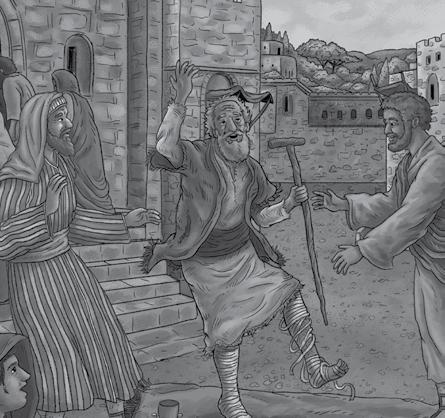
• Does God still heal people today? Is Jesus’ Name still that powerful? Does God still do miracles?

Show the picture in the Children’s Bible while you read the story Peter and John heal a beggar.
• What did the beggar expect to receive from the apostles (followers of Jesus)? How did Peter respond to his request?
• What was the source of the man’s healing? What did faith have to do with the miracle? And whose faith was it?
• Why did Peter and John have to help the man up?
• What did the beggar do after Peter healed him? How do you think he felt? If you were this beggar and you were healed, what would the first thing be you would have done?
• Why were the religious leaders unhappy with Peter and John? What did they do to them?
• What does this story teach us about God the Father, our Heavenly Parent, and Jesus?

• We must open our eyes for God’s miracles. They are still happening all around us. Do you think that because of so much technology nowadays, we don’t see miracles anymore?
• Peter and John said they couldn’t help, but talk about Jesus. Is it hard or easy for you to talk about Jesus?
• How can we respond to God’s blessings?
• Sometimes people do need material help. Pray for discernment (the ability to understand what is another person’s problem, even if they don’t tell you) to recognise when to talk about Jesus before offering material help. How can we learn to meet people’s physical needs while also not ignoring their spiritual needs?
• How can we learn to be more attentive to people we might be tempted to ignore?
Miracles do still happen today! Sometimes we must look past modern medicine to still be able to see miracles. For example: a young boy from Togo in West Africa, named Fabrice, hadn’t spoken a word since the day he was born. He joined a group of followers of Jesus that is working to end poverty in Africa. It soon became clear that although Fabrice couldn’t speak, he understood everything that was said to him. The fact that he couldn’t speak made it difficult for him to communicate with others and making friends, impossible. The doctors at the programme did a few tests and diagnosed Fabrice with a problem with his tongue and after a simple operation Fabrice spoke for the first time! His father is thankful to God that he can hear his son sing and speak today! Or hear about Rihanata, from Burkina Faso. This little girl loved playing outside with friends. One day, Rihanata tripped and fell on a fire, spilling hot sauce all over her skin. Her chest, arms, legs, and face were badly burned.
Rihanata was taken to hospital in the capital, Ouagadougou, but her family couldn’t afford to pay for her care. Thankfully, people helped to cover the cost, because she had to stay in the hospital for almost two years!
Rihanata amazed doctors with her faith and her recovery, and today she and her family believe God healed her in an amazing modern-day miracle. She is without pain even though the scars are still there.
Sometimes God works a miracle without anyone else doing anything. You wake up in the morning and you feel well again after yesterday’s illness. But sometimes the miracle is that God softens someone’s heart to reach out and help. Are you ready for God to use you to perform a miracle in someone’s life?
May God use us to make a difference in the world!

Create a big chart that says: sit down walk jump praise God
Close your eyes and point to the chart. Children must all do the action that you pointed to. Do this several times.
Ask: Which action did you enjoy the most? How do you think the man felt when he could walk? What made him jump? What would make you jump with joy?
Acts 7:54-60

We learn that Jesus gives us courage to stand for what is right.

Ask the children the following questions:
• Have you ever had to do something right, even when others didn’t like it?
• Why is it sometimes hard to tell the truth or stand up for someone who is being treated badly?
• What does it feel like to be brave, even just a little bit?
• Can you think of a time when you saw someone speak up for what was right? What happened?
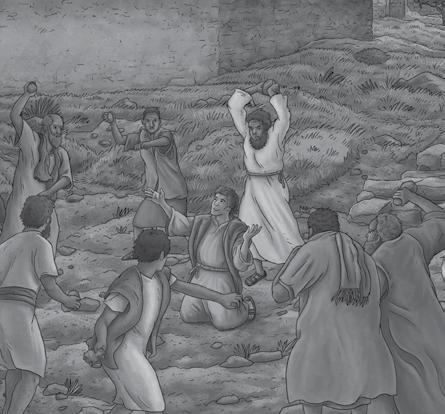
• What do you think gives people the strength to do what’s right when it’s hard?

Show the picture in the Children’s Bible while you read the story Stephen dies because of his faith in Jesus.
• Why were the people angry at Stephen? What was he doing or saying?
• Did Stephen stay quiet or give up?
• What did Stephen see when he looked up to heaven?
• What does this tell us about how Jesus helps people who trust in Him?

• If Jesus is with you, how might that help you to be brave when you need to do what’s right?
• What small things can you do to stand up for truth, kindness or fairness?
• Who might need your voice or help when they are treated unfairly?
Rigoberta Menchú is an indigenous woman, a Mayan Indian of the K’iche’ people. When she was young her people were treated very unfairly and faced violence. She grew up in poverty in a rural area of her country, Guatemala in South America.
When she grew up, she worked as a domestic worker in people’s homes in Guatemala City. Even as a young girl, she spoke out for the rights of her community, sharing their stories so others would listen.
She risked her safety because there were people who didn’t want her to talk about the things that were being done to her people. But she continued to stand up against injustice and worked for peace and human rights. She lost her parents and brother, ended up alone, and had to flee to Mexico in 1981.
From there, she joined other movements to stop violence in Guatemala against indigenous people.
Rigoberta Menchú received the Nobel Peace Prize for her courage and commitment to justice. She said, “I am not the only one who has suffered, but I have chosen to stand up and speak.” Her story shows us that with faith and courage, even one person can help change the world by standing up for what is right.
Rigoberta continues her work of protecting the poorest and more vulnerable people in Guatemala.

Divide the class into groups of about four, each group to prepare a role-play about courage, to perform for the class. Courage is to face fear and do what is right or difficult. It’s not about having no fear, but about having the strength to act even when you are feeling scared.
They can make up a scenario from one of these, or another situation:
• Standing up to a bully
• Speaking up when someone is being treated unfairly
• Trying something new, even if they are scared
• Choosing to do what is right, even when it’s hard
Can you name some of the Bible characters who had courage? Which one do you want to be like?
Here is a verse to remember: Philippians 4:13: I have the strength to face all conditions by the power that Christ gives me.
Acts 8:26-40

To learn that Jesus wants all people to love and follow him. Whoever you are, and wherever you live, he sees you and loves you.

Ask the children the following questions:
• If you could ask any question about God, what would it be?
• What’s the most surprising thing you’ve seen or heard on a journey?
• Have you ever felt like you were in the right place at just the right time?
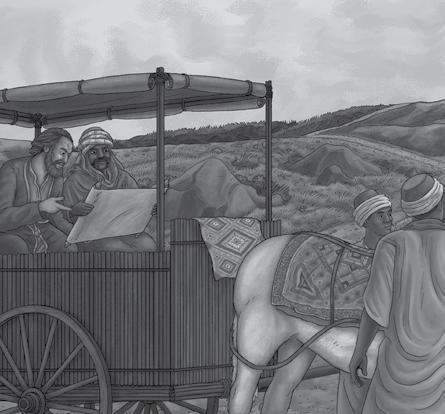
• How would you feel if someone asked you to explain something from the Bible?
• Why do you think people decide to follow Jesus?
• How can you tell when God wants you to do something?

Show the picture in the Children’s Bible while you read the story of A man from Ethiopia becomes a follower of Jesus
• Why were the believers leaving Jerusalem?
• Who was Saul and what was he doing to the believers?
• Where did the angel tell Philip to go?
• Who did Philip meet on the road?
• What was the Ethiopian man doing when Philip found him?
• How did Philip help the man?
• What happened to Philip after the man was baptised?

• Is there something you feel God might be asking you to do?
• What does baptism mean, and why is it important?
• How does this story help you see that God can use anyone—even you?
There’s a wonderful and well-known story about St. Francis of Assisi who lived long ago, in Italy:
One day, he invited a younger priest to go with him to a nearby village to preach. The young man was so excited. “What an amazing chance!” he thought. “I’ll get to learn from the great Francis himself!”
When they got to the village, Francis didn’t start preaching right away. Instead, he stopped to talk kindly with the butcher. Then he went to say hello to the shoemaker. After that, he visited a woman whose husband had recently died and he comforted her. Then they went to the school, where Francis laughed and played with the children and listened to the teachers talk about their struggles.
And that’s how the whole morning went.
By lunchtime, Francis said, “Alright, my friend. We’re done here. Time to head back home.” The young priest was confused and a little upset. “With all due respect, sir,” he said, “we came here to preach. And we haven’t done that at all!”
Francis smiled and asked, “Haven’t we? People were watching us and listening to us all morning. Every word we said, every little thing we did—that was our message. We’ve been preaching all day long!”
No wonder St. Francis once said, “Preach all the time. And if you really must, you can use words.” Like Philip in the story, everything he did and said to the man from Ethiopia helped him to understand the message of Jesus. It makes you think, doesn’t it, about how we act when we are with people, friends or strangers. What we do, and how we talk can help them to see the love of Jesus in us, even before we say His name!

Have red paper, or white paper with red crayons ready and scissors (to share). Have a map of Africa that you can show to the class.
Have the children each make a read heart, about 6x6 cm, and cut it along the lines.
Now, let the children each take off one shoe, and put the heart in the shoe, before they put their shoes on again. If they came barefoot today, let them take the heart home to put in their school shoes before they go to school tomorrow. Otherwise, maybe they can put it in a pocket.
Say: These hearts in your shoes will remind you that the love of Jesus goes with you wherever you go. Jesus lived in Israel, and he showed his love to the man from Ethiopia (show where Ethiopia is on the map). Whether you are in Ethiopia or Ivory coast (show in map) or Uganda (show on map) or (your town/country), you are never too far from Jesus, and never too unimportant for him to ask you to help the people you meet every day.

God can work in everyone’s heart, and bring new life and joy.

Ask the children the following questions:
• Who has had the greatest influence on your life so far? Who taught you the most fun things (like fishing, baking, sewing, etc.)?
• In Biblical days, followers of Jesus were known as the “people of the Way.” What do you think that meant? And what can we learn from it?

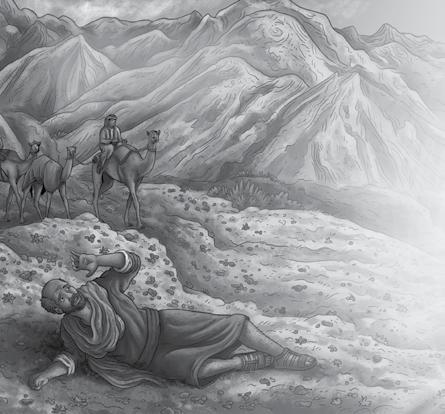
Show the picture in the Children’s Bible while you read the story Saul becomes a follower of Jesus.
• What was Saul trying to do? Why was that so important to him?
• What happened to Saul on the road to Damascus? Whose voice did he hear?
• If you had known Saul before this turning point in his life, and you heard how he met Jesus on the road, how would you have reacted when you heard about the new plan Jesus had for his life?
• How can you be sure someone has really changed? How can we know Saul really changed?
• If you were Ananias, would you obey God this time? Wouldn’t you have been afraid?

• How easy/difficult is it to follow Jesus? Tell people about it!
• When did you decide to follow Jesus? Tell people about it!
• Saul was transformed from someone who persecuted (tried to kill) Jesus and His followers, to someone who followed Jesus wholeheartedly. What will happen if we follow Jesus with our whole life?
• We all need an “Ananias”, someone who encourages and supports us. Who is that for you? And who can you be an Ananias for?
We must remember that even people who act very cool and very cruel are seldom ONLY bad. Many times, a hard person still loves their mother, for example. A little seed of good is still in a person we think is bad. Because, after all: God created them in the first place.
One pastor worked as a hospital chaplain and one of the patients was a nasty, hard man who was busy serving a long term in prison. One day the pastor said to a nurse: “You know that guy who’s here from prison? He has done such terrible things. How can I pray for someone who destroyed other people? He deserves his illness and a whole lot of other things too.”
Do you know what the nurse told him? What would you have told him?
She said: “Pastor, who made you to act like God? Do you know that somewhere deep inside that man, covered by layers of pain and every bad thing he has ever done, there is a spark of the image of God.
Your only job is to see that spark, and the only way you will ever see it is to set aside your bad feelings about him. I ask you to believe with all your heart that the tiny little flame is there. This man, like anyone else you will ever meet, is a child of God’s love. So, treat him accordingly!”
Well, that made the pastor think! It is the same with all of us. Maybe you will find the biggest bully is actually scared of something, and needs care, not fear.

Ask children each to bring a box to Sunday School for today (please bring a few for any child who might have forgotten). Any size box – cereal box, shoe box, grocery box… At class, the instruction to the children is: now, make the outside of the box as ugly as you can. Make it dirty, scribble on it, anything to make the box really ugly. The ugliest box wins.
Then let the children write a verse on a piece of paper and decorate it beautifully. Let them choose a verse from among:
Zephaniah 3:17: The Lord will take delight in you, and in his love he will give you new life. He will sing and be joyful over you.
Genesis 1:27: So God created human beings, making them to be like himself. He created them male and female
Ephesians 2:10: God has made us what we are, and in our union with Christ Jesus he has created us for a life of good deeds, which he has already prepared for us to do. Put the verse you have written in the box. Keep it to remind you that everyone, never mind how ugly and naughty you think they might be, has a little “spark” inside, something beautiful because they are created and loved by God. Give them a chance, they may surprise you one day.
Acts 17

We learn that God is at work all over the world, and we are God’s partners.

Ask the children the following questions:
• Have you ever travelled to a different town or place and seen something new?
• Do you think God is only with people who go to church or live like you do?
• Where do you think God is working right now? In your town, in another country, or in the world?
• What is something you’ve seen or heard about in another culture or country that shows love or kindness?
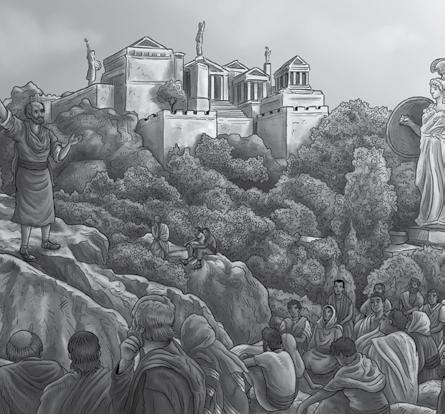
• Have you ever met someone who believes in God in a different way than you do?

Show the picture in the Children’s Bible while you read the story Paul travels to tell the Good News.
• Where was Paul when he spoke in this story? Did the people there believe in Jesus yet?
• What did Paul say about God? Where does God live?
• What does Paul mean when he says that God is not far from anyone (Acts 17:27)?
• What do we learn about God’s love for all people in this story?

• How does it feel to know that God is working in places you’ve never seen and in people who look or live differently than you?
• What can you do to notice and join in where God is already at work around you?
• How can we treat others with love and curiosity, even if they don’t believe the same things we do?
Kent Brantly is a Christian doctor from America who went to Liberia in West Africa with his wife, Amber and two children. He was there to help people during the Ebola outbreak in 2014. The disease was very dangerous, and many people were afraid.
But he said he felt God calling him to go, because God cares for people everywhere. Even when he got sick himself, he trusted that God was still at work. He later recovered and continued sharing love and care with others. He said, “I chose to follow Jesus. He went to the sick. He touched the hurting. He never ran from suffering.”
His story does not end there. In 2019 he decided he would come back to Africa, far away from home, and serve the people of Zambia, showing them the love of Jesus, and working in a hospital.
His story reminds us that God’s love has no borders and when we follow Jesus, we join what God is doing all over the world.

Before class, prepare by getting six pieces of paper. Draw the outline of Africa on one, and each of the other continents, each on a piece of paper
Divide the class into six groups.
Give each group a drawing that you have done on a large sheet of paper, of one of the continents on earth (and even some islands, if you like).
On their continent, let each group either draw or paste pictures from newspapers or magazines of:
• An animal or two that they think live of that continent
• Some people who live on the continent
• A place that they know of, like the Amazon River, or the Grand Canyon, or the Eifel tower, or the pyramids of Giza….
• And draw something that to them, symbolises that God is present and at work on that continent.
When you put all the groups’ work together, you should have a world map!

e Children’s Ministry Practitioner Resource accompanying the best-selling Classical Children’s Bible Series is written using omas Groome’s Faith Education Model. is approach encourages a lively interaction between children’s present-day experiences and the Christian Story and Vision— rooted in Scripture, tradition, and the call to live out God’s Word.
Designed for Children’s Ministry Practitioners, the notes are built around the 57 stories included in the children’s Bibles. Each lesson is simple to follow, resource-friendly, and shaped to connect faith with everyday life. Using Groome’s model, the notes include:

• A clear aim and outcome
• “Our Story” (our life now) with questions to engage children before the Bible reading
• “Our New Story” (what we learn from God’s Word)
• A related real-life story for deeper connection

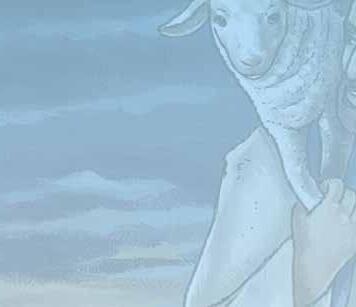
• A suggested activity to reinforce the lesson ese notes provide practical, adaptable tools to help children encounter the Bible as a living story and respond with authentic faith.
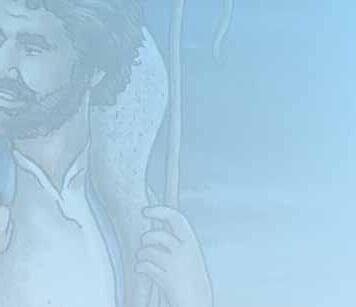

Children's Ministry Resource for the Classical Children's Bible Series:


